Here are my favorite poems about mystery categorized:
- Short poems about mystery
- Poems about the mystery of life
- Poems about mystery and love
- Poems about mystery and suspense
- Poems about the mystery of death
So if you want the best poems about mystery, then you’re in the right place.
Keep scrolling down!
- 63 Cryptic Poems About the Unknown
- 27 Bewildering Poems About Illusion
- 63 Spellbinding Poems About Fate
- 27 Motivating Poems About the Future
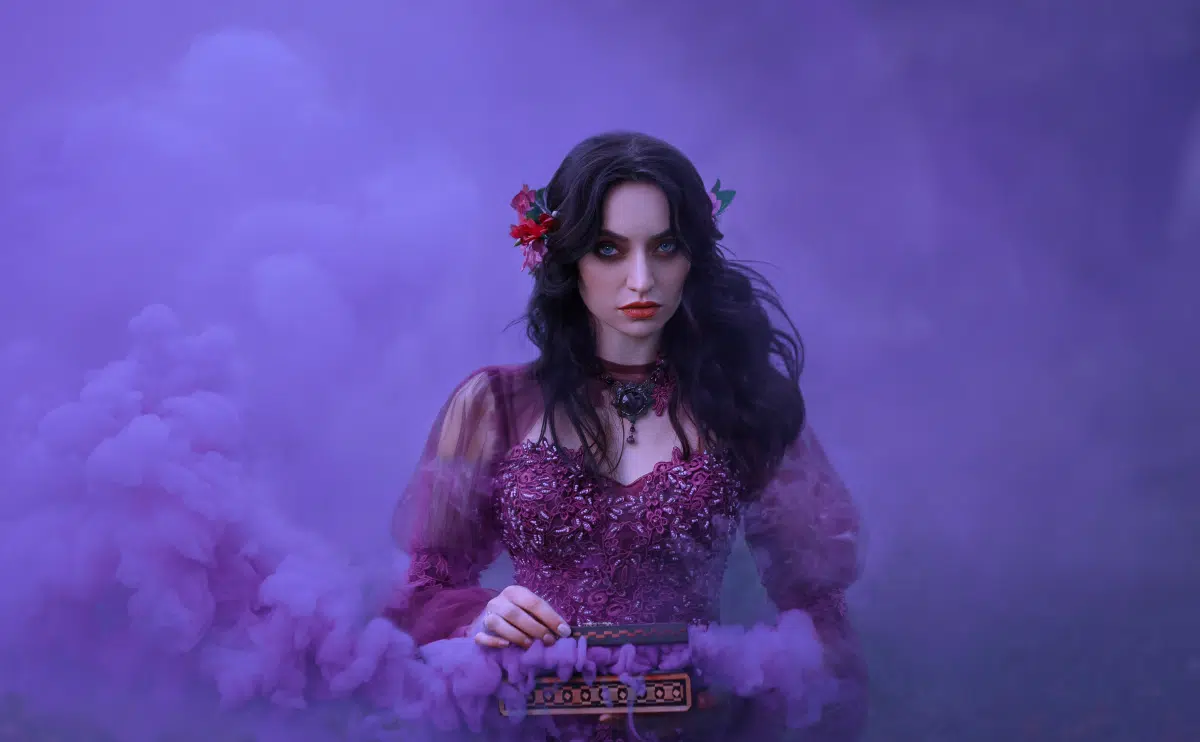
Gripping Poems About Mystery
Unveil a meticulously curated collection of extraordinary poems about mystery, crafted with utmost care to enthrall and intrigue.
From enigmatic verses that unravel secrets, to captivating compositions that immerse you in the realm of the unknown, discover the essence of mystery in one captivating anthology.
Indulge in the allure of riddles and the mystique of hidden truths as you navigate through this handpicked selection of poetic masterpieces.
Embark on a captivating journey through the enigmatic world of mystery and let these captivating verses ignite your imagination, leaving you spellbound and yearning for answers.
Let’s dice into it!
My #1 Favorite Poem About Mystery
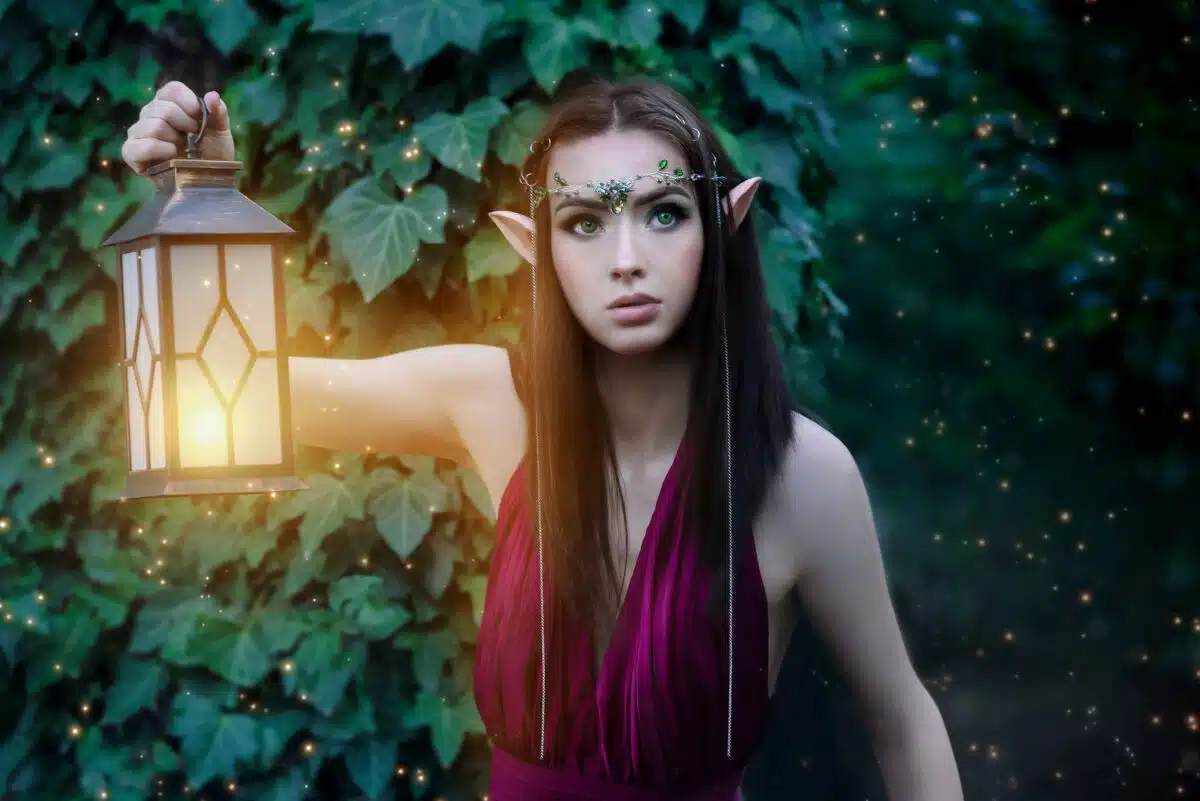
“Mystery” by Walter Murdoch
Why does this sudden passion smite me?
I stretch my hands, all blind to see:
I need the lamp of the world to light me,
Lead me and set me free.
Something a moment seemed to stoop from
The night with cool, cool breath on my face:
Or did the hair of the twilight droop from
Its silent wandering ways?
About me in the thick wood netted
The wizard glow looks human-wise;
And over the tree-tops barred and fretted
Ponders with strange old eyes.
The tremulous lips of air blow by me
And hymn their time-old melody:
Its secret strain comes nigh and nigh me:
“Ah, brother, come with me;
“For here the ancient mother lingers
To dip her hands in the diamond dew,
And lave thine ache with cloud-cool fingers
Till sorrow die from you.”
Short Poems About Mystery
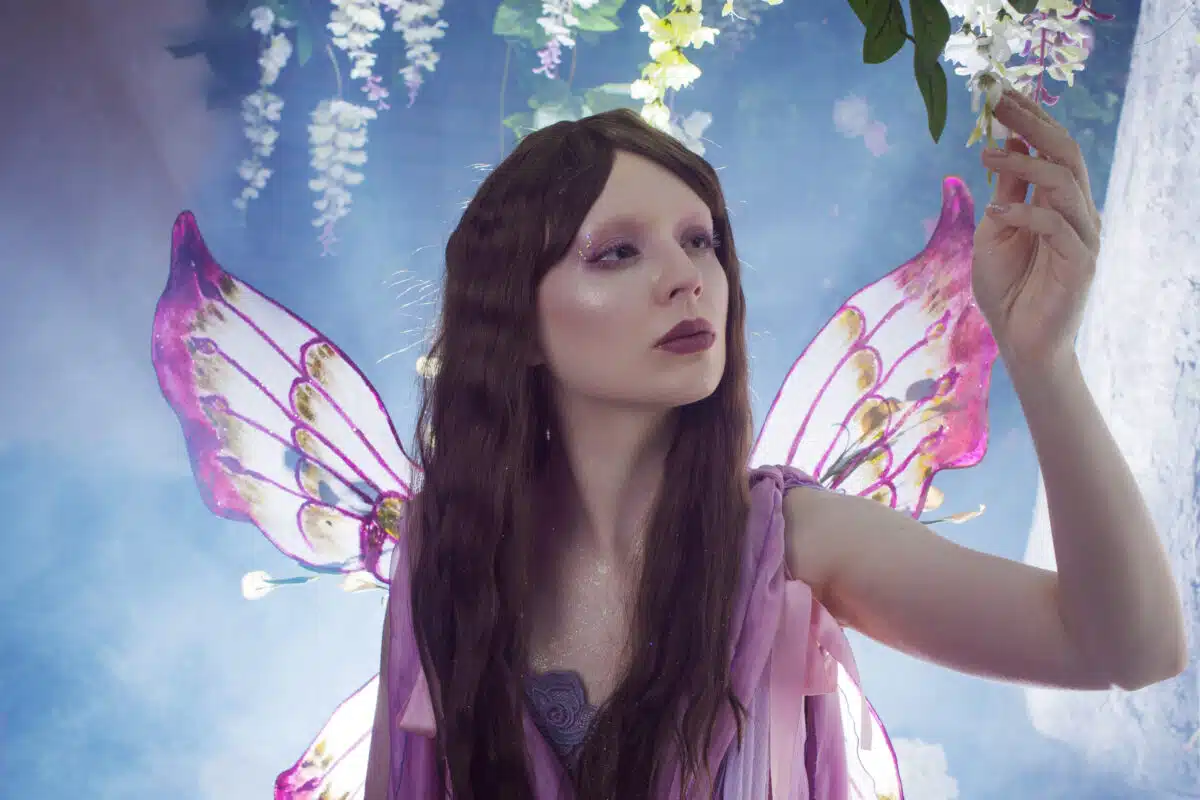
“The Mystery” by Lilian Whiting
You gave me roses, love, last night,
When the sea was blue and the skies were bright;
And the earth was aglow with a golden light
When you gave me roses, love, last night.
Lilies I lay by your side to-day,
And your face—it is colder and whiter than they;
And I linger and listen and wonder and pray,
As I bring you lilies to-day.
“The Question” by Charles Granville
You in the dark of death
Quietly sleeping;
I in my shuttered room
Silently weeping:
Quickens your being in God—
You unawaking—
Or does my heart alone
Live on—and breaking?
“The Vowels: An Enigma” by Jonathan Swift
We are little airy creatures,
All of different voice and features;
One of us in glass is set,
One of us you ’ll find in jet,
T’other you may see in tin,
And the fourth a box within;
If the fifth you should pursue,
It can never fly from you.
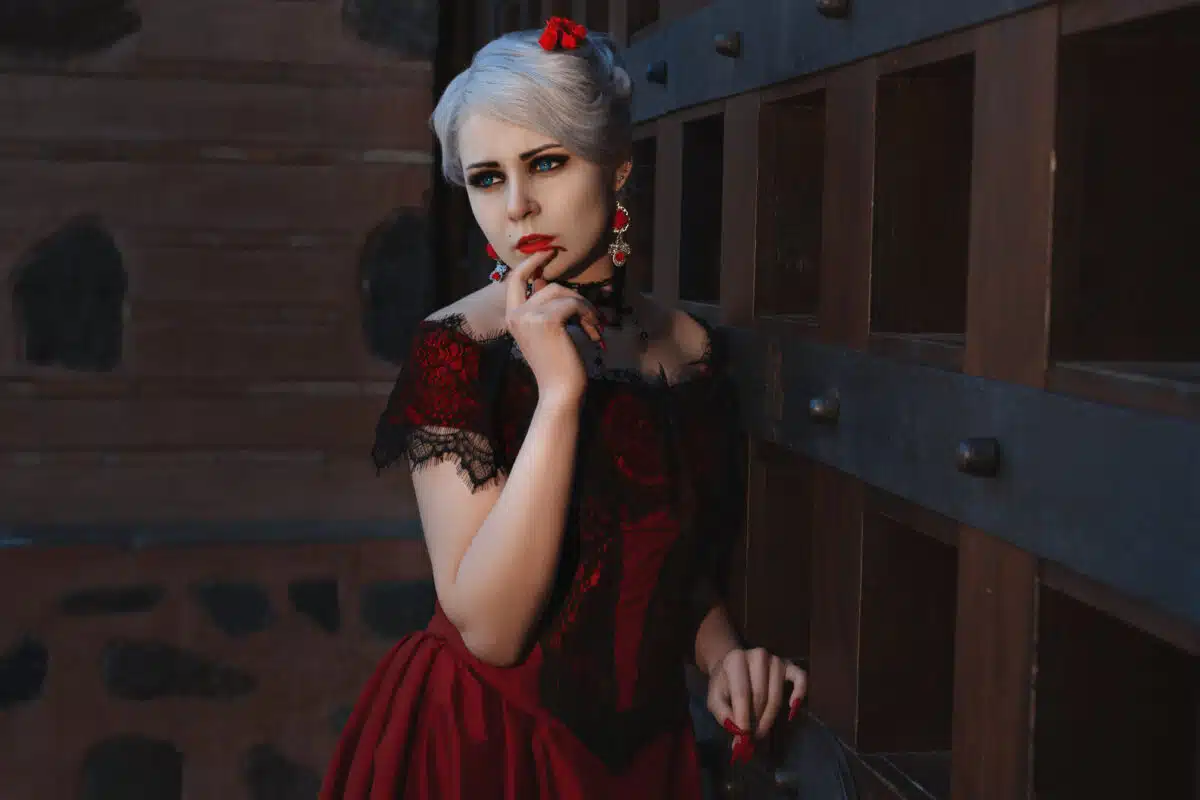
“The Mystery Of Pain” by Emily Elizabeth Dickinson
Pain has an element of blank;
It cannot recollect
When it began, or if there were
A day when it was not.
It has no future but itself,
Its infinite realms contain
Its past, enlightened to perceive
New periods of pain.
“They said this mystery never shall cease” by William Blake
They said this mystery never shall cease:
The priest promotes war, and the soldier peace.
“Bas-Relief” by Carl Sandburg
Five geese deploy mysteriously.
Onward proudly with flagstaffs,
Hearses with silver bugles,
Bushes of plum-blossoms dropping
For ten mystic web-feet—
Each his own drum-major,
Each charged with the honor
Of the ancient goose nation,
Each with a nose-length surpassing
The nose-lengths of rival nations.
Somberly, slowly, unimpeachably,
Five geese deploy mysteriously.
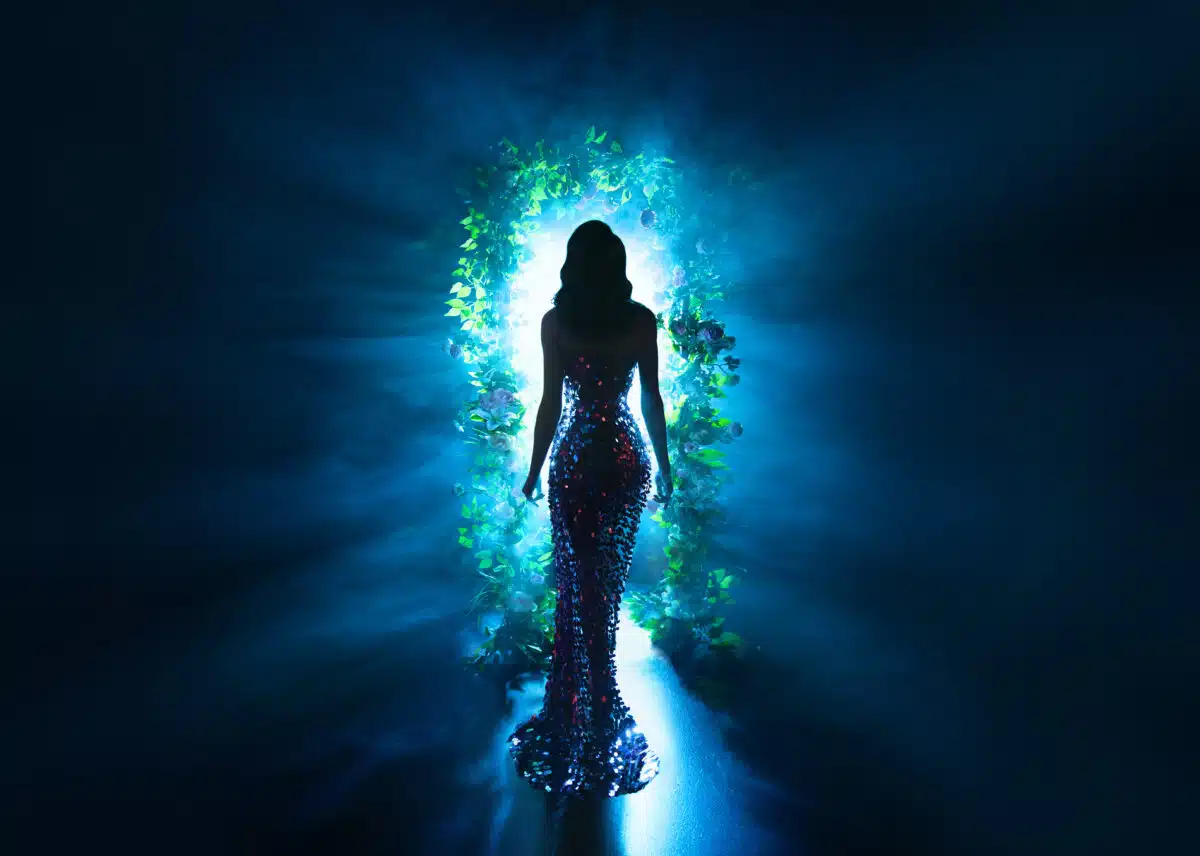
“A Hymn to Night” by Max Michelson
Come, mysterious night;
Descend and nestle to us.
Descend softly on the houses
We built with pride,
Without worship.
Fold them in your veil,
Spill your shadows.
Come over our stores and factories,
Hide our pride—our shame—
With your nebulous wings.
Come down on our cobbled streets:
Unleash your airy hounds.
Come to the sleepers, night;
Light in them your fires.
“The Magi” by W. B. Yeats
Now as at all times I can see in the mind’s eye,
In their stiff, painted clothes, the pale unsatisfied ones
Appear and disappear in the blue depth of the sky
With all their ancient faces like rain-beaten stones,
And all their helms of silver hovering side by side,
And all their eyes still fixed, hoping to find once more,
Being by Calvary’s turbulence unsatisfied,
The uncontrollable mystery on the bestial floor.
“The Luzumiyat of Abu’l-Ala, CXXI” by Al-Ma‘arri (Ameen Rihani, Translator)
Howbeit, my inner vision heir shall be
To the increasing flames of mystery
Which may illumine yet my prisons all,
And crown the ever living hope of me.
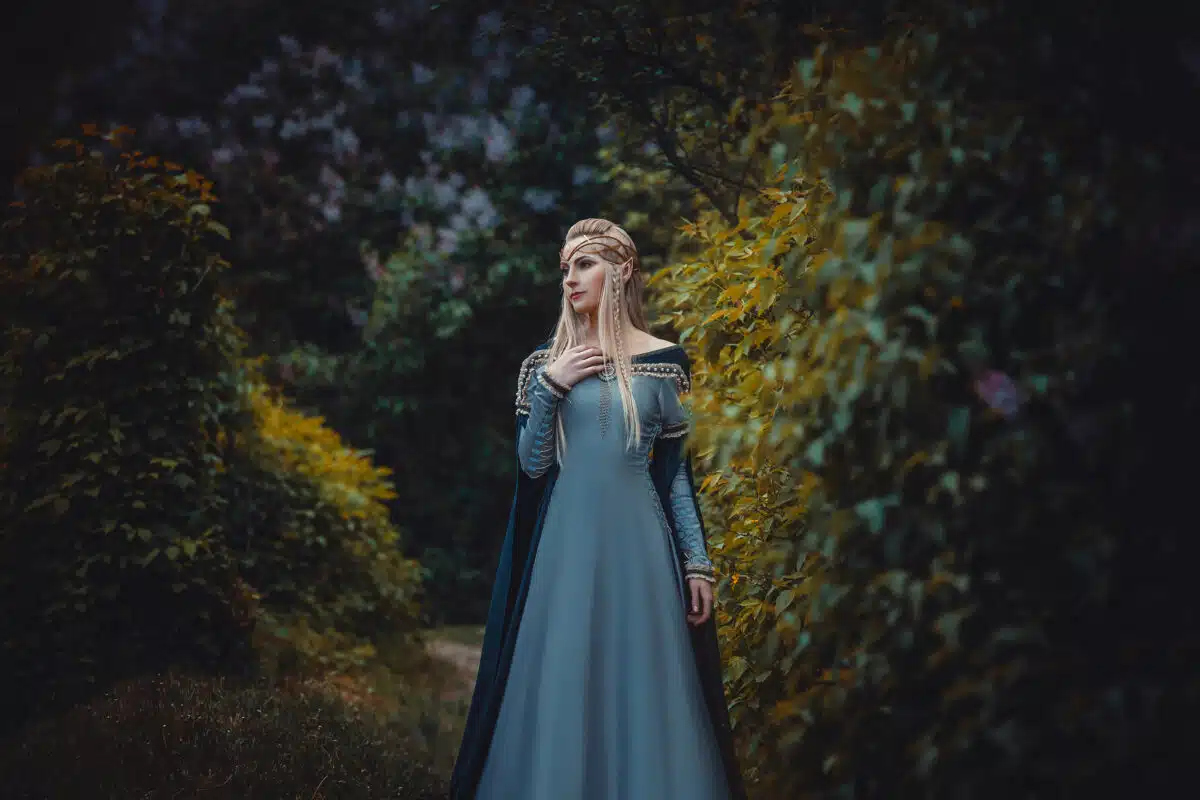
“Life’s Mystery” by Alfred Castner King
I live, I move, I know not how, nor why,
Float as a transient bubble on the air,
As fades the eventide I, too, must die;
I came, I know not whence; I journey, where?
“The Luzumiyat of Abu’l-Ala, XLI” by Al-Ma‘arri (Ameen Rihani, Translator)
One draught, more bitter than the Zakkum tree,
Brought us unto the land of mystery
Where rising Sand and Dust and Flame conceal
The door of every Caravanseri.
“Three Dimensions” by Man Ray
Several small houses
Discreetly separated by foliage
And the night—
Maintaining their several identities
By light
Which fills the inside of each—
Not as masses they stand
But as walls
Enclosing and excluding
Like shawls
About little old women—
What mystery hides within
What curiosity lurks without
One the other
Knows nothing about.
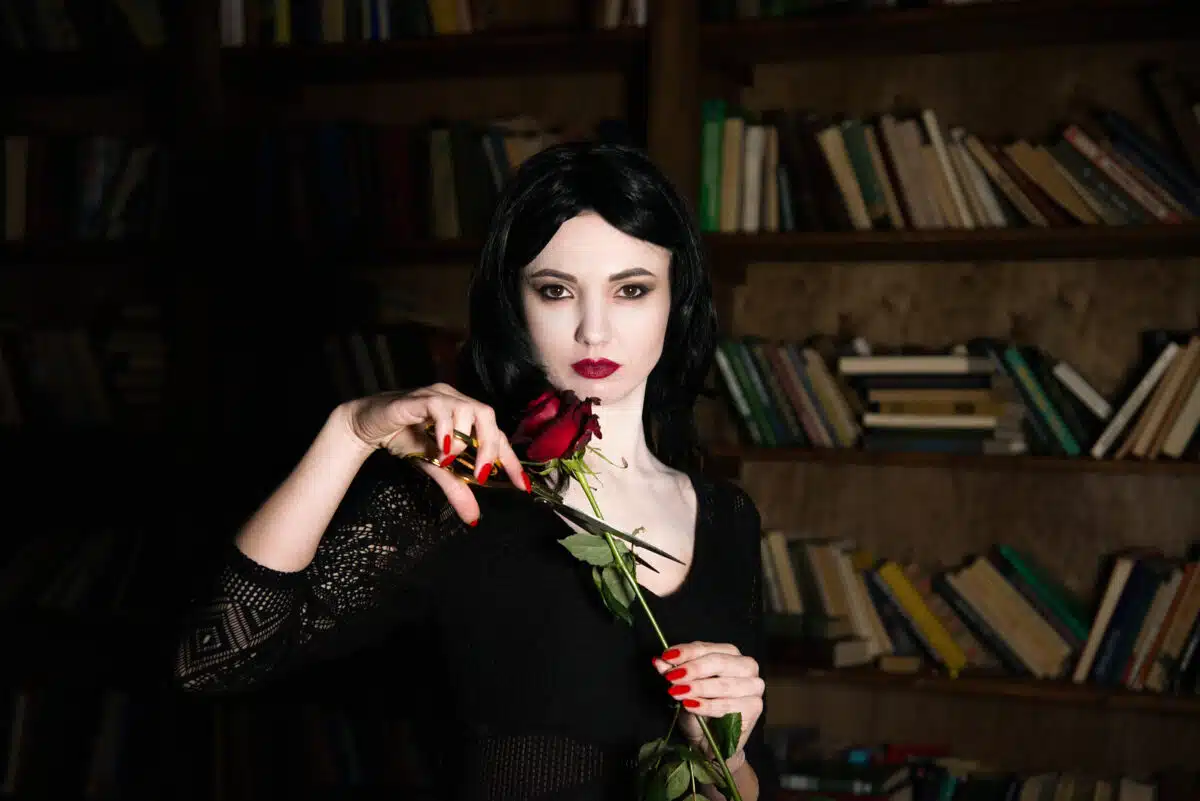
“The Mystery” by Ralph Hodgson
He came and took me by the hand
Up to a red rose tree,
He kept His meaning to Himself
But gave a rose to me.
I did not pray Him to lay bare
The mystery to me;
Enough the rose was Heaven to smell,
And His own face to see.
“Invisible” by Emily Elizabeth Dickinson
From us she wandered now a year,
Her tarrying unknown;
If wilderness prevent her feet,
Or that ethereal zone
No eye hath seen and lived,
We ignorant must be.
We only know what time of year
We took the mystery.
“The Morning Pool” by Clark Ashton Smith
All night the pool held mysteries,
Vague depths of night that lay in dream,
Where phantoms of the pale-white stars
Wandered, with darkness-tangled gleam.
And now it holds the limpid light
And shadeless azure of the skies,
Wherein, like some enclaspèd gem,
The morning’s golden glamour lies.
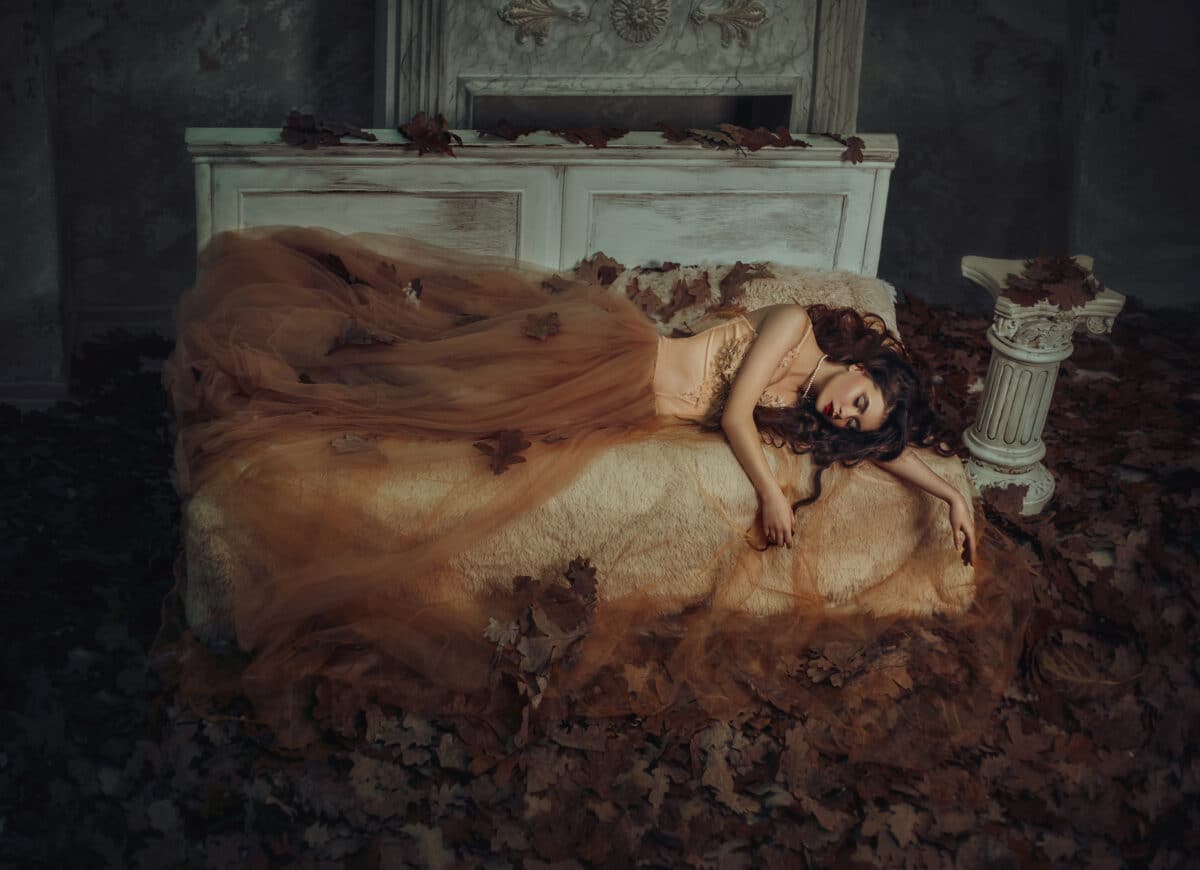
“Sleep and His Brother Death” by William Hamilton Hayne
Just ere the darkness is withdrawn,
In seasons of cold or heat,
Close to the boundary line of Dawn
These mystical brothers meet.
They clasp their weird and shadowy hands,
As they listen each to each,
But never a mortal understands
Their strange immortal speech.
“Walking at Night” by Edward Shanks
The moon poured down on tree and field,
The leaf was silvered on the hedge,
The sleeping kine were half revealed,
Half shadowed at the pasture’s edge.
By steep inclines and long descents,
Amid the inattentive trees,
You spoke of the four elements,
The four eternal mysteries.
“To an Unknown Poet” by Yone Noguchi
When I am lost in the deep body of the
mist on the hill,
The world seems built with me as its
pillar!
Am I the god upon the face of the deep, deepless
deepness in the Beginning?
Poems About the Mystery of Life
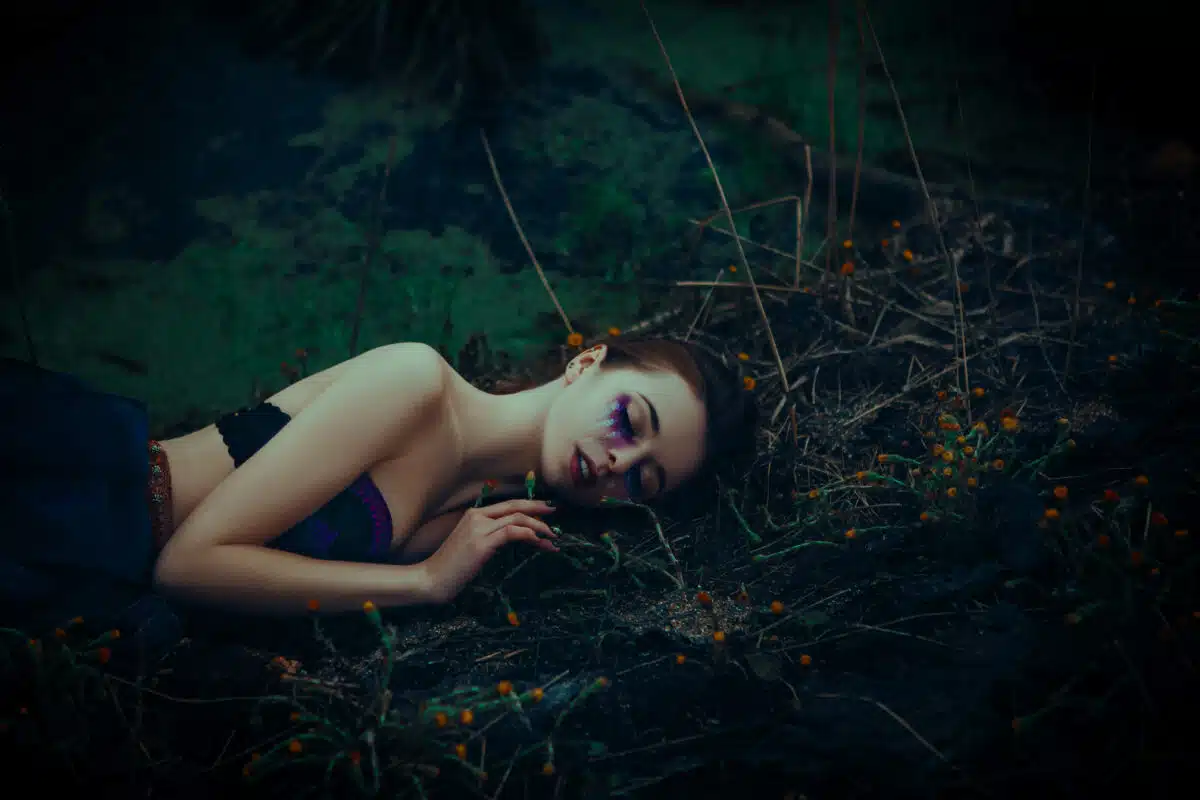
“Human Life’s Mystery” by Elizabeth Barrett Browning
We sow the glebe, we reap the corn,
We build the house where we may rest,
And then, at moments, suddenly,
We look up to the great wide sky,
Inquiring wherefore we were born…
For earnest or for jest?
The senses folding thick and dark
About the stifled soul within,
We guess diviner things beyond,
And yearn to them with yearning fond;
We strike out blindly to a mark
Believed in, but not seen.
We vibrate to the pant and thrill
Wherewith Eternity has curled
In serpent-twine about God’s seat;
While, freshening upward to His feet,
In gradual growth His full-leaved will
Expands from world to world.
And, in the tumult and excess
Of act and passion under sun,
We sometimes hear—oh, soft and far,
As silver star did touch with star,
The kiss of Peace and Righteousness
Through all things that are done.
God keeps His holy mysteries
Just on the outside of man’s dream;
In diapason slow, we think
To hear their pinions rise and sink,
While they float pure beneath His eyes,
Like swans adown a stream.
Abstractions, are they, from the forms
Of His great beauty?—exaltations
From His great glory?—strong previsions
Of what we shall be?—intuitions
Of what we are—in calms and storms,
Beyond our peace and passions?
Things nameless! which, in passing so,
Do stroke us with a subtle grace.
We say, ‘Who passes?’—they are dumb.
We cannot see them go or come:
Their touches fall soft, cold, as snow
Upon a blind man’s face.
Yet, touching so, they draw above
Our common thoughts to Heaven’s unknown,
Our daily joy and pain advance
To a divine significance,
Our human love—O mortal love,
That light is not its own!
And sometimes horror chills our blood
To be so near such mystic Things,
And we wrap round us for defence
Our purple manners, moods of sense—
As angels from the face of God
Stand hidden in their wings.
And sometimes through life’s heavy swound
We grope for them!—with strangled breath
We stretch our hands abroad and try
To reach them in our agony,—
And widen, so, the broad life-wound
Which soon is large enough for death.
“Light Shining out of Darkness” by William Cowper
God moves in a mysterious way,
His wonders to perform;
He plants his footsteps in the sea,
And rides upon the storm.
Deep in unfathomable mines
Of never-failing skill,
He treasures up his bright designs,
And works his sov’reign will.
Ye fearful saints, fresh courage take,
The clouds ye so much dread
Are big with mercy, and shall break
In blessings on your head.
Judge not the Lord by feeble sense,
But trust him for his grace;
Behind a frowning providence
He hides a smiling face.
His purposes will ripen fast,
Unfolding ev’ry hour;
The bud may have a bitter taste,
But sweet will be the flow’r.
Blind unbelief is sure to err,
And scan his work in vain;
God is his own interpreter,
And he will make it plain.
“The Mystery of the Incarnation” by Laurence Housman
Comest Thou peaceably, O Lord?
‘Yea, I am Peace!
Be not so fearful to afford
Thy Maker room! for I am the Reward
To which all generations of increase
Looking did never cease.
‘Down from amid dark wings of storm
I set My Feet
To earth. Will not My earth grow warm
To feel her Maker take the form
He made, when now, Creation’s purpose meet,
Man’s body is to be God’s Mercy-seat?’
Lord, I am foul: there is no whole
Fair part in me
Where Thou canst deign to be!
This form is not Thy making, since it stole
Fruit from the bitter Tree.
‘Yet still thou hast the griefs to give in toll
That I may test the sickness of man’s soul.’
O Lord, my work is without worth!
I am afraid,
Lest I should man the blissful Birth.
Quoth Christ, ‘Ere seas had shores, or earth
Foundations laid,
My Cross was made!’
‘Naught canst thou do that was not willed
By Love to be,
To bring the Work to pass through Me.
No knee
Stiffens, or bends before My Sov’reignty,
But from the world’s beginning hath fulfilled
Its choice betwixt the valleyed and the hilled.
For both, at one decree,
My Blood was spilled.’
Yet canst Thou use these sin-stained hands?
‘These hands,’ quoth Christ,
‘Of them I make My need:
Since they sufficed to forge the bands
Wherein I hunger, they shall sow the seed!
And with bread daily they shall feed
My Flesh till, bought and bound, It stands
A Sacrifice to bleed.’
Lord, let this house be swept and garnished first!
For fear lest sin
Do there look in,
Let me shut fast the windows: lest Thou thirst,
Make some pure inner well of waters burst:
For no sweet water can man’s delving win—
Earth is so curst.
Also bar up the door: Thou wilt do well
To dwell, whilst with us, anchorite in Thy cell.
Christ said ‘Let be: leave wide
All ports to grief!
Here when I knock I will not be denied
The common lot of all that here abide;
Were I so blinded, I were blind in chief:
How should I see to bring the blind relief?
Wilt Thou so make Thy dwelling? Then I fear
Man, after this, shall dread to enter here:
For all the inner courts will be so bright,
He shall be dazzled with excess of light,
And turn, and flee!
‘But from his birth I will array him right,
And lay the temple open for his sight,
And say to help him, as I bid him see:
“This is for thee!” ’

“A Great Mystery” by Anna Bunston De Bary
Strangely, strangely, Lord, this morning
Camest Thou beneath my roof,
Shorn of all Thy royal adorning,
Stripp’d of judgement and reproof,
The King of kings yet gladly scorning,
Every plea but love’s behoof.
‘Can this be God?’ I said, ‘who enters,
This be God who climbs my stair?
God sits high in heavenly centres,
And though He hath us in His care,
’Tis as His adopted children,
Slaves redeemed from Satan’s snare.
God is mightier than the mountains,
Far more majesty would wear,
This One comes like summer fountains,
Hath no snow upon His hair.
With eagle pinions God will cover
Those who seek for refuge there,
But these are dove-like wings that hover,
God was never half so fair.’
Then with voice like falling water
Viewless angels sang to me,
Fear not thou, O virgin daughter,
Thy King desires thy poverty.
At that ‘Ave Maria’
I arose and I obeyed;
O my King Cophetua,
I, Thy blessed beggar-maid,
Who once lay among the potsherds
Stand in silver plumes arrayed;
I, who lonely in the vineyards
Morn and noon and evening strayed.
Now am wrapt in Thine embraces,
’Neath Thy banner ‘Love’ am laid,
Made partaker of Thy graces,
I, the outcast beggar-maid.
No excuse and no invention
Makes me less unworthy Thee,
No prostration, no pretension
Of unique humility,
But Thy glorious condescension
Blazes through my misery,
And Thy love finds full extension
In the nothingness of me.
Dark my soul, yet Thou hast sought her,
My night allows Thy day to shine,
Thou the grape art, I the water—
Both together make the wine.
I the clay and Thou the craftsman,
I the boat and Thou the strand,
I the pencil, Thou the draughtsman,
I the harp and Thou the hand.
But the world with envy raging
Fain would snatch me, Lord, from Thee,
And Death and Hell their war are waging,
Therefore go not far from me.
By the mystery of this housel,
By this momentary truth,
By the love of this espousal,
By this kindness of my youth,
By Thy promise of remembrance,
By that sweet perversity
That makes my dark uncomely semblance
Seem desirable to Thee—
Leave me not lest faith should falter,
O! secure my fealty,
I the victim on Thine altar,
Thou the fire consuming me.
From ‘The Mystic’ by Philip James Bailey
God was, alone in unity. He willed
The infinite creation; and it was.
That the creation might exist, His Son,
And that it might return to Him, the Spirit
Disclosed themselves within Him; thus triune
But as the all-made must of necessity
Inferior be to its creator, thus
Arose the infinite imperfect, time,
The spirit-host angelic, heavenly race,
Brute life and vegetive, electric light,
Matter and fleshly form; to human souls
Nine generations from aeternity.
But God, who is Love, decreed it should return
By pure regeneration unto God;
Wherefore was need that He from whom came life
Should taste death, but in tasting swallow up;
That commune with all creatures might be made,
On this hand, and on that, with Deity.
Thus death and evil expiate ends divine;
The Spirit the imperfect hallowing, death
The Son; the soul regenerate hies to God;
And as in radial union with the point
Infinite, both in greatness, place, and power.
Lives with the maker and the all-made in love.
“The Mystic” by David Atwood Wasson
I. Knowledge
The secret of the World is lowly,
Self-sung nigh my pleading ear;
It presses close, enchanting, holy,
Murmuring,—what, I cannot hear:
A dream embosoming all my waking,
Solace shaming all my fear.
In hours serenest and profoundest,
List I’yond the breadth of time:
Over the sea of calm Thou soundest;
Now I catch the tune, the rhyme,
And now shall know!—Alas! the silence
Ripples, broken; dies the chime.
Partial, the universal Mother
Tells her secret to the stars:
And they intone it each to other,
Trooping in their silver cars.
Winging and witching comes the echo,
But mine ear the meaning bars.
When the sunlight, aether flooding,
Rains its richness down the sky,
The Fact on every beam is brooding,
And on every leaf an eye
Implanteth, where the dauntless, dimless,
Godlike vision I espy.
The psalmist pine-tree, sounding, sweeping
One great chord forevermore;
Deep-chested Ocean’s chant, as, keeping
Time upon the throbbing shore,
His billowy palm still falls and rises,—
Both recount that wondrous lore.
The World is rich, it hath possession;
Joy of wealth fills land and sea;
The fields in bloom, the stars in session,
Birds and blades on bough and lea,
All know the truth, the joy, the wonder,
Not revealed to man, to me.
Nature, be just in thy bestowing!
Best to best shouldst thou confide.
Oh! why from him, whose bliss is knowing,
Knowledge, cruel, dost thou hide?
Since, that withholden, naught is given;
Given, naught withheld beside.
II. Life
A goblet drained is all my knowing,—
Cup whence I have quaffed the wine:
From out the Unknown comes the flowing
And exhaustless juice divine,
That lends the blood its priceless crimson,
And the eye its living shine.
Embrace me, Mystery of Being;
Fill my arteries, flood my brain,
And through me pour thy heart, till seeing,
Thought, are drowned, like dew in rain,
In powerful, pure participation:
Separate life is separate pain.
Temple unseen of Truth immortal,
Thought hath brought me to thy door;
Never passes he the portal,
I am drawn the threshold o’er;
And lo! I am a leaf that quivers
In God’s joy-wind evermore!
Now are the light-waves round me rolling,
Now the love-tides through me run,
Body and soul anew ensouling:
Seeing and being melt in one.
The ear is self-same with the music,
Beam with vision, eye with sun.
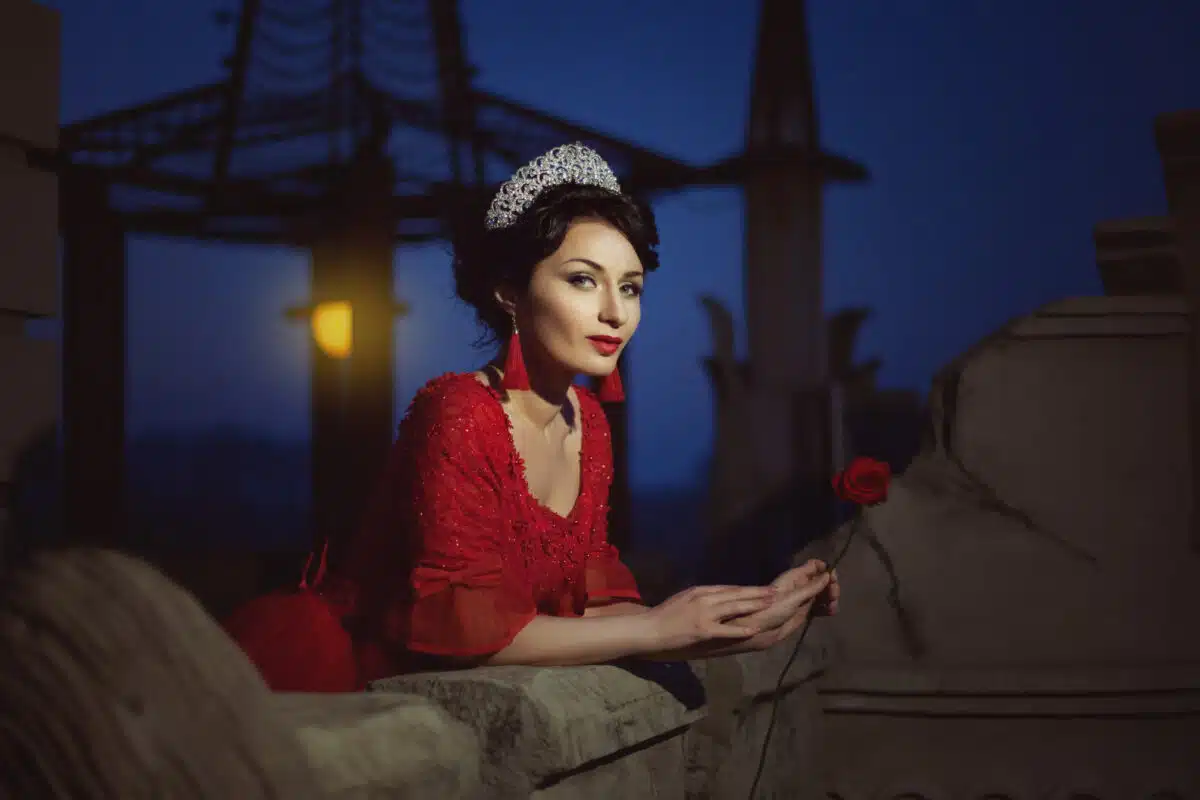
“The Mystic Rose” by Elsa Barker
I’ woman, am that wonder-breathing rose
That blossoms in the garden of the King.
In all the world there is no lovelier thing,
And the learned stars no secret can disclose
Deeper than mine—that almost no one knows.
The perfume of my petals in the spring
Is inspiration to all bards that sing
Of love, the spirit’s lyric unrepose.
Under my veil is hid the mystery
Of unaccomplished aeons, and my breath
The Master-Lover’s life replenisheth.
The mortal garment that is worn by me
The loom of Time renews continually;
And when I die—the universe knows death.
“The Darkling Thrush” by Thomas Hardy
I leant upon a coppice gate
When Frost was spectre-gray,
And Winter’s dregs made desolate
The weakening eye of day.
The tangled bine-stems scored the sky
Like strings of broken lyres,
And all mankind that haunted nigh
Had sought their household fires.
The land’s sharp features seem’d to be
The Century’s corpse outleant,
His crypt the cloudy canopy,
The wind his death-lament.
The ancient pulse of germ and birth
Was shrunken hard and dry,
And every spirit upon earth
Seem’d fervourless as I.
At once a voice arose among
The bleak twigs overhead
In a full-hearted evensong
Of joy illimited;
An aged thrush, frail, gaunt, and small,
In blast-beruffled plume,
Had chosen thus to fling his soul
Upon the growing gloom.
So little cause for carollings
Of such ecstatic sound
Was written on terrestrial things
Afar or nigh around,
That I could think there trembled through
His happy good-night air
Some blessèd Hope, whereof he knew
And I was unaware.
“Multitudes Turn in Darkness” by Conrad Aiken
The half-shut doors through which we heard that music
Are softly closed. Horns mutter down to silence,
The stars wheel out, the night grows deep.
Darkness settles upon us; a Vague refrain
Drowsily teases at the drowsy brain.
In numberless rooms we stretch ourselves and sleep.
Where have we been ? What savage chaos of music
Whirls in our dreams? We suddenly rise in darkness,
Open our eyes, cry out, and sleep once more.
We dream we are numberless sea-waves, languidly foaming
A warm white moonlit shore;
Or clouds blown windily over a sky at midnight,
Or chords of music scattered in hurrying darkness,
Or a singing sound of rain
We open our eyes and stare at the coiling darkness,
And enter our dreams again.
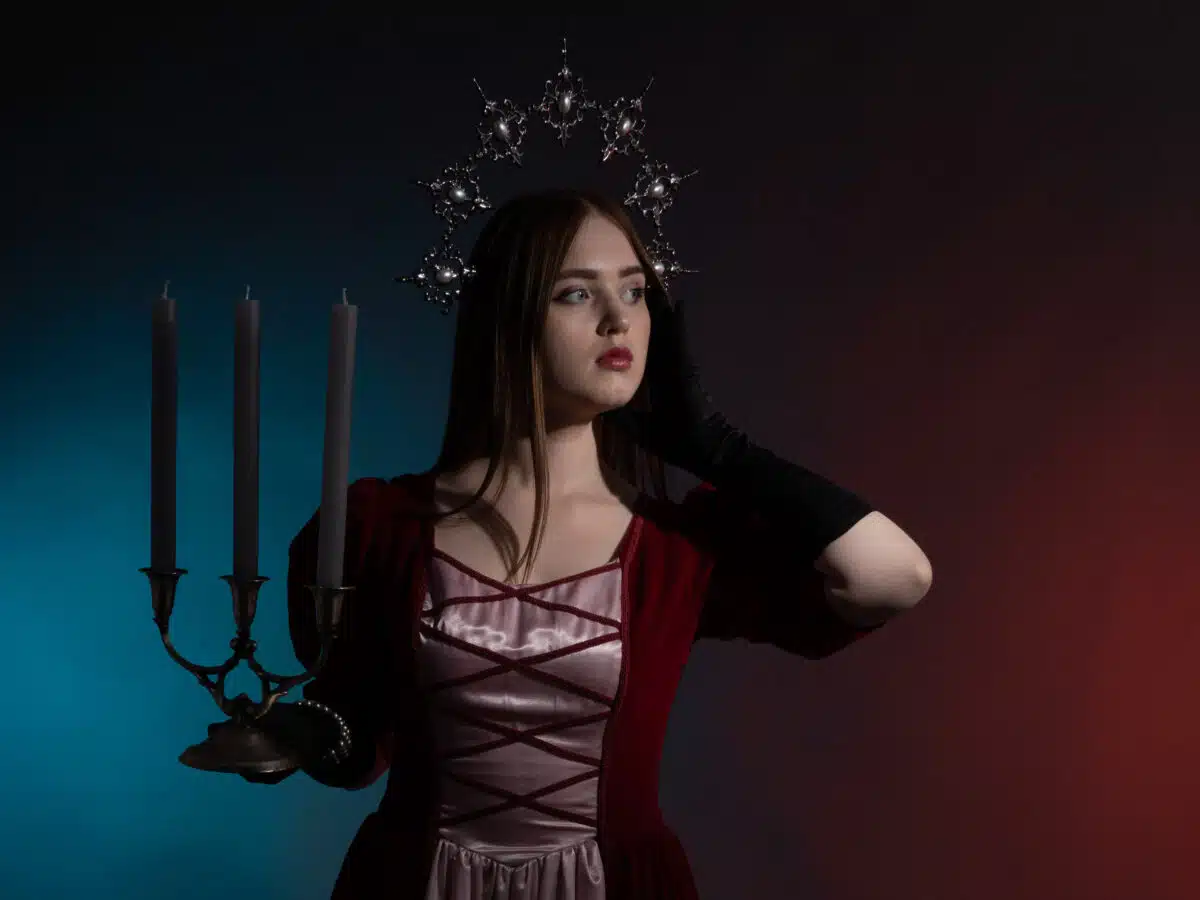
“Hymn to Darkness” by John Norris
Hail thou most sacred venerable thing!
What Muse is worthy thee to sing?
Thee, from whose pregnant universal womb
All things, even Light thy rival, first did come.
What dares he not attempt that sings of thee,
Thou first and greatest mystery?
Who can the secrets of thy essence tell?
Thou like the light of God art inaccessible.
Before great Love this monument did raise,
This ample theatre of praise.
Before the folding circles of the sky
Were tun’d by Him who is all harmony.
Before the morning stars their hymn began,
Before the councel held for man.
Before the birth of either Time or Place,
Thou reign’st unquestion’d monarch in the empty space.
Thy native lot thou didst to Light resign,
But still half of the globe is thine.
Here with a quiet, and yet aweful hand,
Like the best emperours thou dost command.
To thee the stars above their brightness owe,
And mortals their repose below.
To thy protection Fear and Sorrow flee,
And those that weary are of light, find rest in thee.
Tho light and glory be th’ Almighty’s throne,
Darkness in His pavilion.
From that His radiant beauty, but from thee
He has His terror and His majesty.
Thus when He first proclaim’d His sacred Law,
And would His rebel subjects awe,
Like princes on some great solemnity,
H’ appear’d in’s robes of State, and clad Himself with thee.
The blest above do thy sweet umbrage prize,
When cloy’d with light, they veil their eyes.
The vision of the Deity is made
More sweet and beatifick by thy shade.
But we poor tenants of this orb below
Don’t here thy excellencies know,
Till Death our understandings does improve,
And then our wiser ghosts thy silent night-walks love.
But thee I now admire, thee would I chuse
For my religion, or my Muse.
‘Tis hard to tell whether thy reverend shade
Has more good votaries or poets made,
From thy dark caves were inspirations given,
And from thick groves went vows to Heaven.
Hail then thou Muse’s and Devotion’s spring,
‘Tis just we should adore, ’tis just we should thee sing.
“In the Dark City” by John Hall Wheelock
There is a harper plays
Through the long watches of the lonely night
When, like a cemetery,
Sleeps the dark city, with her millions laid each in his tomb.
I feel it in my dream; but when I wake,
Suddenly, like some secret thing not to be overheard,
It ceases—
And the gray night grows dumb.
Only in memory
Linger, those veiled adagios, fading, fading . . .
Till, with the morning, they are lost.
What door was opened then ?
What worlds undreamed of lie around us in our sleep,
That yet we may not know ?
Where is it one sat playing
Over and over, with such high and dreadful peace,
The passion and sorrow of the eternal doom?
“Omnia Exeunt in Mysterium” by George Sterling
The stranger in my gates-lo! that am I,
And what my land of birth I do not know,
Nor yet the hidden land to which I go.
One may be lord of many ere he die,
And tell of many sorrows in one sigh,
But know himself he shall not, nor his woe,
Nor to what sea the tears of wisdom flow;
Nor why one star is taken from the sky.
An urging is upon him evermore,
And though he bide, his soul is wanderer,
Scanning the shadows with a sense of haste-
Where fade the tracks of all who went before:
A dim and solitary traveller
On ways that end in evening and the waste.
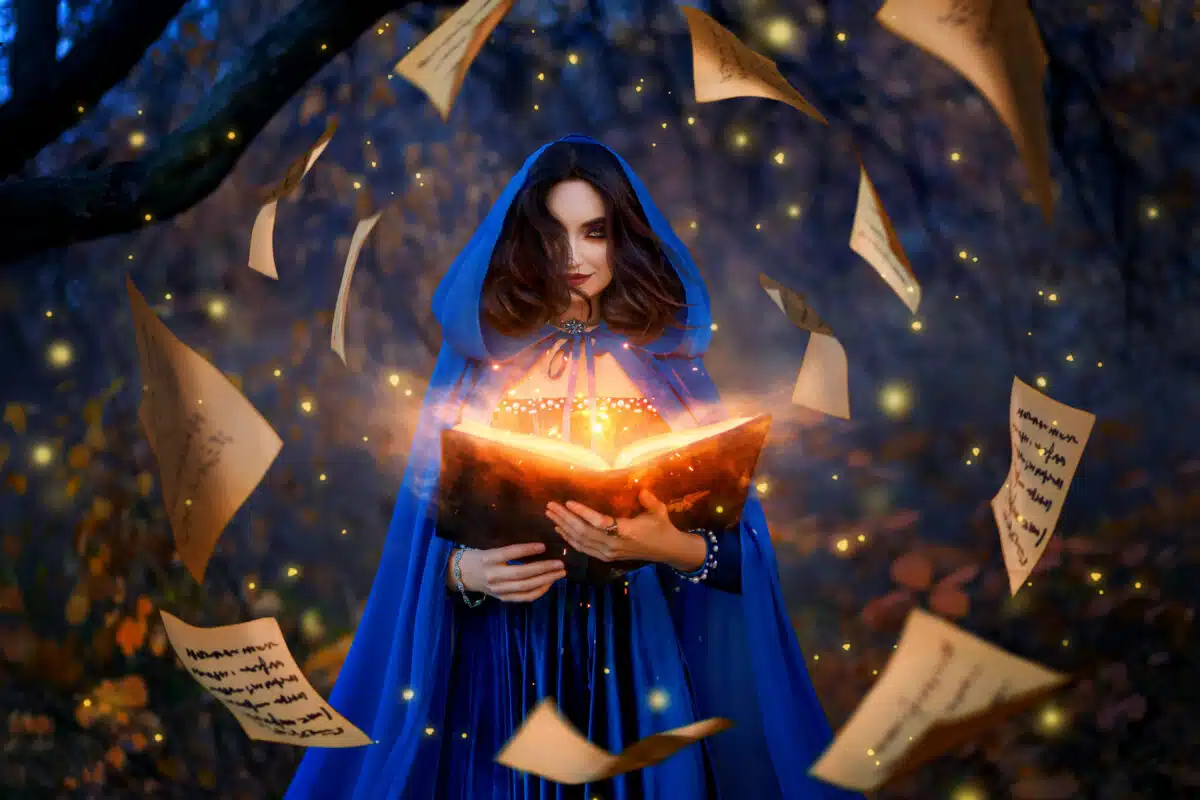
“The Poet’s Secret” by Elizabeth Stoddard
The poet’s secret I must know,
If that will calm my restless mind.
I hail the seasons as they go,
I woo the sunshine, brave the wind.
I scan the lily and the rose,
I nod to every nodding tree,
I follow every stream that flows,
And wait beside the steadfast sea.
I question melancholy eyes,
I touch the lips of women fair:
Their lips and eyes may make me wise,
But what I seek for is not there.
In vain I watch the day and night,
In vain the world through space may roll;
I never see the mystic light
Which fills the poet’s happy soul.
Through life I hear the rhythmic flow
Whose meaning into song must turn;
Revealing all he longs to know,
The secret each alone must learn.
“The Poet” by Yone Noguchi
Out of the deep and the dark,
A sparkling mystery, a shape,
Something perfect,
Comes like the stir of the day:
One whose breath is an odor,
Whose eyes show the road to stars,
The breeze in his face,
The glory of heaven on his back.
He steps like a vision hung in air,
Diffusing the passion of eternity;
His abode is the sunlight of morn,
The music of eve his speech:
In his sight,
One shall turn from the dust of the grave,
And move upward to the woodland.
“As Some Mysterious Wanderer of the Skies” by Henry Jerome Stockard
As some mysterious wanderer of the skies,
Emerging from the deeps of outer dark,
Traces for once in human ken the arc
Of its stupendous curve, then swiftly flies
Out through some orbit veiled in space, which lies
Where no imagination may embark,—
Some onward-reaching track that God did mark
For all eternity beneath his eyes,—
So comes the soul forth from creation’s vast
So clothed with mystery moves through mortal sight;
Then sinks away into the Great Unknown.
What systems it hath seen in all the past,
What worlds shall blaze upon its future flight,
Thou knowest, eternal God, and thou alone!
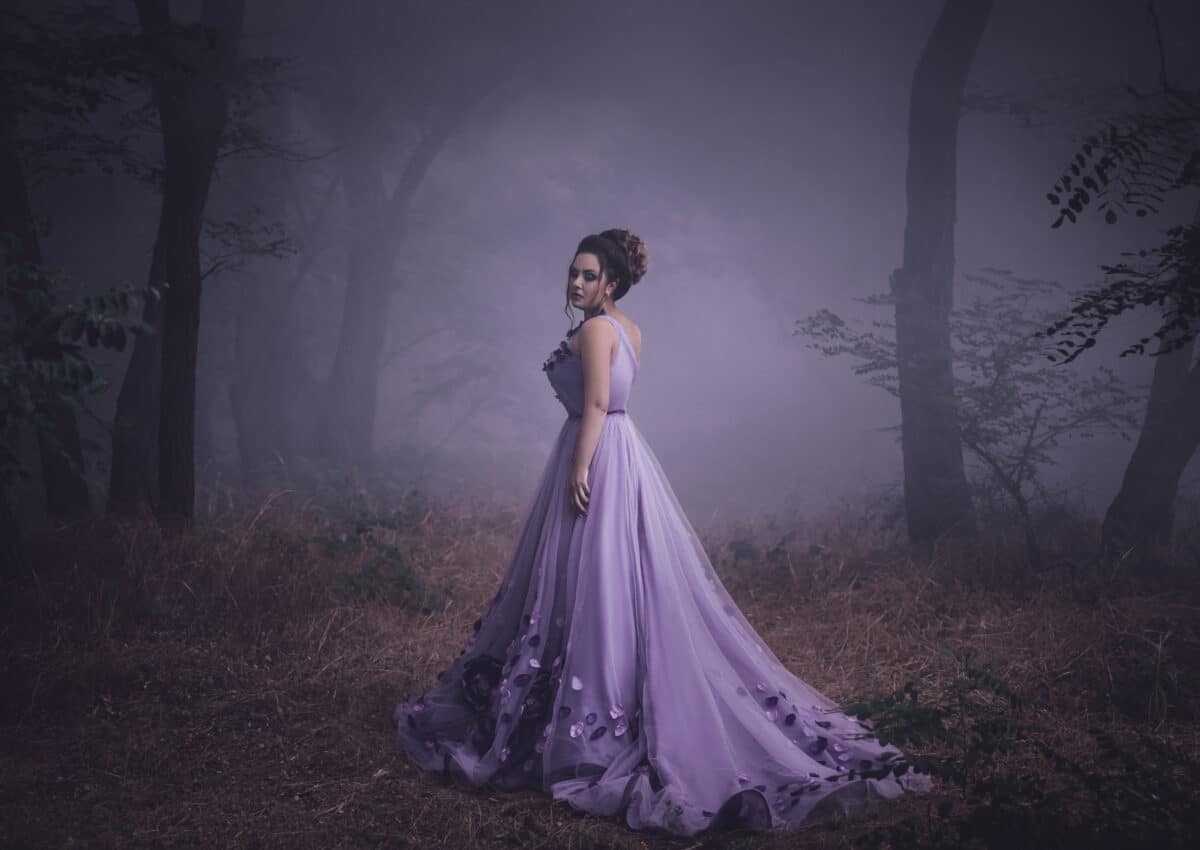
“Night” by Joseph Blanco White
Mysterious Night! When our first parent knew
Thee, from report divine, and heard thy name,
Did he not tremble for this lovely Frame,
This glorious canopy of Light and Blue?
Yet, ‘neath a curtain of translucent dew,
Bathed in the rays of the great setting Flame,
Hesperus, with the Host of Heaven, came,
And lo! Creation widened on Man’s view.
Who could have thought such darkness lay concealed
Within thy beams, O Sun! or who could find,
Whilst flower and leaf and insect stood revealed,
That to such countless orbs thou mad’st us blind!
Why do we then shun Death with anxious strife?
If Light can thus deceive, wherefore not Life?
“The Heavens Are Our Riddle” by Herbert Bates
The heavens are our riddle; and the sea,
Forested earth, the grassy rustling plain,
Snows, rains, and thunders. Yea, and even we
Before ourselves stand ominous. In vain!
The stars still march their way, the sea still rolls,
The forests wave, the plain drinks in the sun,
And we stand silent, naked,—with tremulous, souls,—
Before our unsolved selves. We pray to one
Whose hand should help us. But we hear no voice;
Skies clear and darken; the days pale and pass,
Nor any bids us weep or bids rejoice.
Only the wind sobs in the shrivelling grass,—
Only the wind,—and we with upward eyes
Expectant of the silence of the skies.
“The Mystery of God” by Frederick Lucian Hosmer
O thou, in all thy might so far,
In all thy love so near,
Beyond the range of sun and star,
And yet beside us here, —
What heart can comprehend thy name,
Or, searching, find thee out,
Who art within, a quickening Flame,
A Presence round about?
Yet though I know thee but in part,
I ask not, Lord, for more:
Enough for me to know thou art,
To love thee and adore.
O sweeter now than aught besides,
The tender mystery
That like a veil of shadow hides
The Light I may not see!
And dearer than all things I know
Is childlike faith to me,
That makes the darkest way I go
An open path to thee.
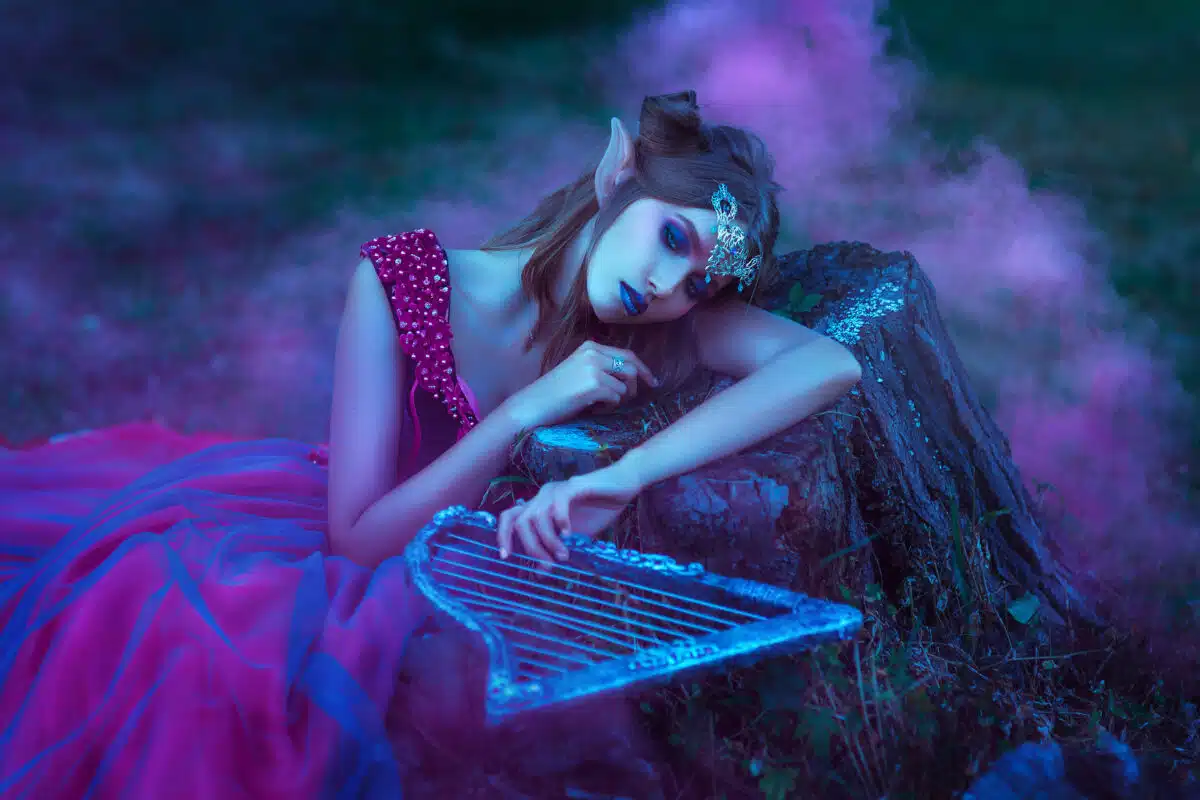
“A Mystery” by John Greenleaf Whittier
The river hemmed with leaning trees
Wound through its meadows green;
A low, blue line of mountains showed
The open pines between.
One sharp, tall peak above them all
Clear into sunlight sprang
I saw the river of my dreams,
The mountains that I sang!
No clue of memory led me on,
But well the ways I knew;
A feeling of familiar things
With every footstep grew.
Not otherwise above its crag
Could lean the blasted pine;
Not otherwise the maple hold
Aloft its red ensign.
So up the long and shorn foot-hills
The mountain road should creep;
So, green and low, the meadow fold
Its red-haired kine asleep.
The river wound as it should wind;
Their place the mountains took;
The white torn fringes of their clouds
Wore no unwonted look.
Yet ne’er before that river’s rim
Was pressed by feet of mine,
Never before mine eyes had crossed
That broken mountain line.
A presence, strange at once and known,
Walked with me as my guide;
The skirts of some forgotten life
Trailed noiseless at my side.
Was it a dim-remembered dream?
Or glimpse through ions old?
The secret which the mountains kept
The river never told.
But from the vision ere it passed
A tender hope I drew,
And, pleasant as a dawn of spring,
The thought within me grew,
That love would temper every change,
And soften all surprise,
And, misty with the dreams of earth,
The hills of Heaven arise.
“The Mystic” by Cale Young Rice
There is a quest that calls me,
In nights when I am lone,
The need to ride where the ways divide
The Known from the Unknown.
I mount what thought is near me
And soon I reach the place,
The tenuous rim where the Seen grows dim
And the Sightless hides its face.
I have ridden the wind,
I have ridden the sea,
I have ridden the moon and stars.
I have set my feet in the stirrup seat
Of a comet coursing Mars.
And everywhere
Thro’ the earth and air
My thought speeds, lightning-shod,
It comes to a place where checking pace
It cries, “Beyond lies God!”
It calls me out of the darkness,
It calls me out of sleep,
“Ride! ride! for you must, to the end of Dust!”
It bids — and on I sweep
To the wide outposts of Being,
Where there is Gulf alone —
And thro’ a Vast that was never passed
I listen for Life’s tone.
I have ridden the wind,
I have ridden the night,
I have ridden the ghosts that flee
From the vaults of death like a chilling breath
Over eternity.
And everywhere
Is the world laid bare —
Ether and star and clod —
Until I wind to its brink and find
But the cry, “Beyond lies God!”
It calls me and ever calls me!
And vainly I reply,
“Fools only ride where the ways divide
What Is from the Whence and Why”!
I’m lifted into the saddle
Of thoughts too strong to tame
And down the deeps and over the steeps
I find — ever the same.
I have ridden the wind,
I have ridden the stars,
I have ridden the force that flies
With far intent thro’ the firmament
And each to each allies.
And everywhere
That a thought may dare
To gallop, mine has trod —
Only to stand at last on the strand
Where just beyond lies God.
“A Well” by Emily Elizabeth Dickinson
What mystery pervades a well!
The water lives so far,
Like neighbor from another world
Residing in a jar.
The grass does not appear afraid;
I often wonder he
Can stand so close and look so bold
At what is dread to me.
Related somehow they may be, —
The sedge stands next the sea,
Where he is floorless, yet of fear
No evidence gives he.
But nature is a stranger yet;
The ones that cite her most
Have never passed her haunted house,
Nor simplified her ghost.
To pity those that know her not
Is helped by the regret
That those who know her, know her less
The nearer her they get.
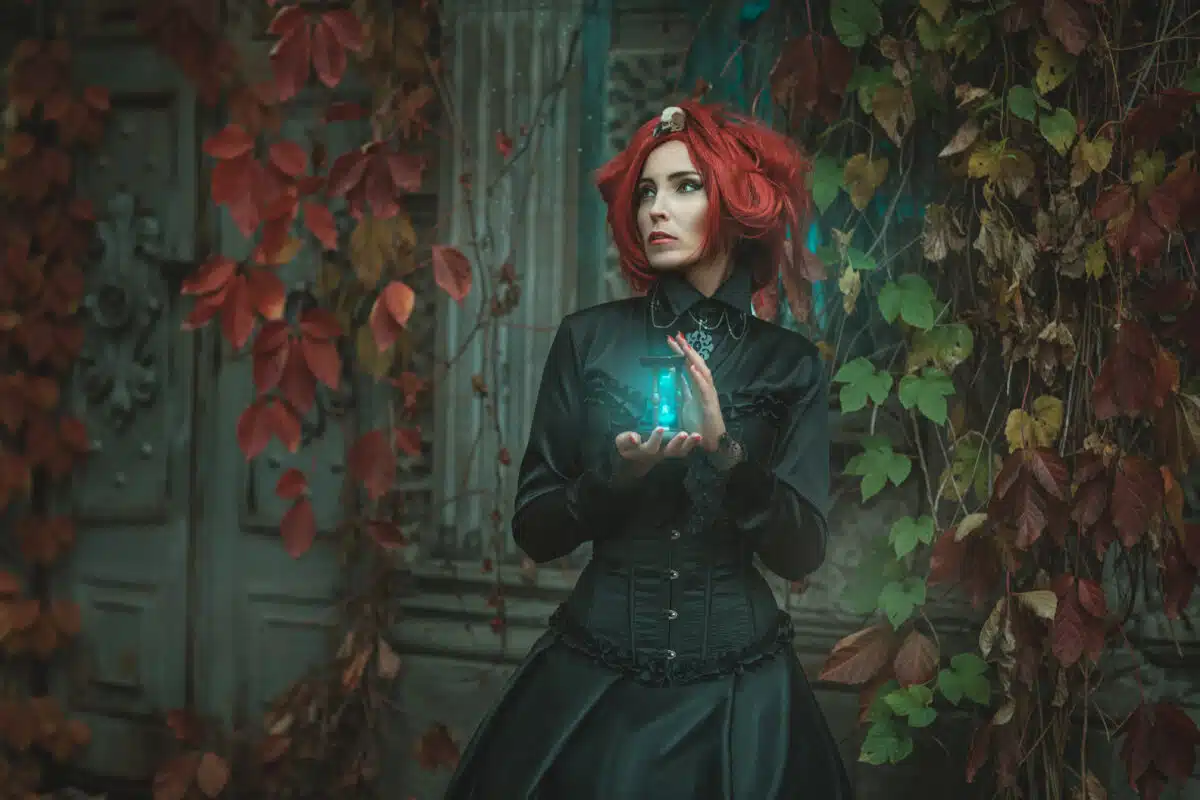
“A Mystery” by Abram Joseph Ryan
His face was sad; some shadow must have hung
Above his soul; its folds, now falling dark,
Now almost bright; but dark or not so dark,
Like cloud upon a mount, ’twas always there —
A shadow; and his face was always sad.
His eyes were changeful; for the gloom of gray
Within them met and blended with the blue,
And when they gazed they seemed almost to dream
They looked beyond you into far-away,
And often drooped; his face was always sad.
His eyes were deep; I often saw them dim,
As if the edges of a cloud of tears
Had gathered there, and only left a mist
That made them moist and kept them ever moist.
He never wept; his face was always sad.
I mean, not many saw him ever weep,
And yet he seemed as one who often wept,
Or always, tears that were too proud to flow
In outer streams, but shrunk within and froze —
Froze down into himself; his face was sad.
And yet sometimes he smiled — a sudden smile,
As if some far-gone joy came back again,
Surprised his heart, and flashed across his face
A moment like a light through rifts in clouds,
Which falls upon an unforgotten grave;
He rarely laughed; his face was ever sad.
And when he spoke his words were sad as wails,
And strange as stories of an unknown land,
And full of meanings as the sea of moans.
At times he was so still that silence seemed
To sentinel his lips; and not a word
Would leave his heart; his face was strangely sad.
But then at times his speech flowed like a stream —
A deep and dreamy stream through lonely dells
Of lofty mountain-thoughts, and o’er its waves
Hung mysteries of gloom; and in its flow
It rippled on lone shores fair-fringed with flowers,
And deepened as it flowed; his face was sad.
He had his moods of silence and of speech.
I asked him once the reason, and he said:
“When I speak much, my words are only words,
When I speak least, my words are more than words,
When I speak not, I then reveal myself!”
It was his way of saying things — he spoke
In quaintest riddles; and his face was sad.
And, when he wished, he wove around his words
A nameless spell that marvelously thrilled
The dullest ear. ‘Twas strange that he so cold
Could warm the coldest heart; that he so hard
Could soften hardest soul; that he so still
Could rouse the stillest mind: his face was sad.
He spoke of death as if it were a toy
For thought to play with; and of life he spoke
As of a toy not worth the play of thought;
And of this world he spoke as captives speak
Of prisons where they pine; he spoke of men
As one who found pure gold in each of them.
He spoke of women just as if he dreamed
About his mother; and he spoke of God
As if he walked with Him and knew His heart —
But he was weary, and his face was sad.
He had a weary way in all he did,
As if he dragged a chain, or bore a cross;
And yet the weary went to him for rest.
His heart seemed scarce to know an earthly joy,
And yet the joyless were rejoiced by him.
He seemed to have two selves — his outer self
Was free to any passer-by, and kind to all,
And gentle as a child’s; that outer self
Kept open all its gates, that who so wished
Might enter them and find therein a place;
And many entered; but his face was sad.
The inner self he guarded from approach,
He kept it sealed and sacred as a shrine;
He guarded it with silence and reserve;
Its gates were locked and watched, and none might pass
Beyond the portals; and his face was sad.
But whoso entered there — and few were they —
So very few — so very, very few,
They never did forget; they said: “How strange!”
They murmured still: “How strange! how strangely strange!”
They went their ways, but wore a lifted look,
And higher meanings came to common words,
And lowly thoughts took on the grandest tones;
And, near or far, they never did forget
The “Shadow and the Shrine”; his face was sad.
He was not young nor old — yet he was both;
Nor both by turns, but always both at once;
For youth and age commingled in his ways,
His words, his feelings, and his thoughts and acts.
At times the “old man” tottered in his thoughts,
The child played thro’ his words; his face was sad.
I one day asked his age; he smiled and said:
“The rose that sleeps upon yon valley’s breast,
Just born to-day, is not as young as I;
The moss-robed oak of twice a thousand storms —
An acorn cradled ages long ago —
Is old, in sooth, but not as old as I.”
It was his way — he always answered thus,
But when he did his face was very sad.
“Mirage” by Luis G. Dato
I saw in dreams a landscape
With not a shadow by,
It seemed so like a promise
Half-hidden in the sky.
There were high hills and mountains
In purple drest and green,
Like shades and shapes fantastic
Only in dreaming seen.
The waters clear and limpid
Had but a speck to mar,
For in the depths was mirrored
The image of a Star.
Only but once there hovered
Indistinct forms and lone,
Calling to mind the faces
I knew in days by-gone.
I seemed to see them falter
As they were lost to view,
They paused and fell to doubting
Which pathway to pursue.
To them faint words were given,
I thought I heard them say,
We know not where to wander,
But cannot choose to stay.
“Over the realms of heaven
We silently must rove,
With but the Star to guide us
Back to the friends we love.”
Ah, fleeting are the fancies,
Deceiving us too well,
Nor sage nor saint can fathom
The mysteries they tell.
“The Mystery Of A Year” by Archibald Lampman
A little while, a year agone,
I knew her for a romping child,
A dimple and a glance that shone
With idle mischief when she smiled.
To-day she passed me in the press,
And turning with a quick surprise
I wondered at her stateliness,
I wondered at her altered eyes.
To me the street was just the same,
The people and the city’s stir;
But life had kindled into flame,
And all the world was changed for her.
I watched her in the crowded ways,
A noble form, a queenly head,
With all the woman in her gaze,
The conscious woman in her tread.
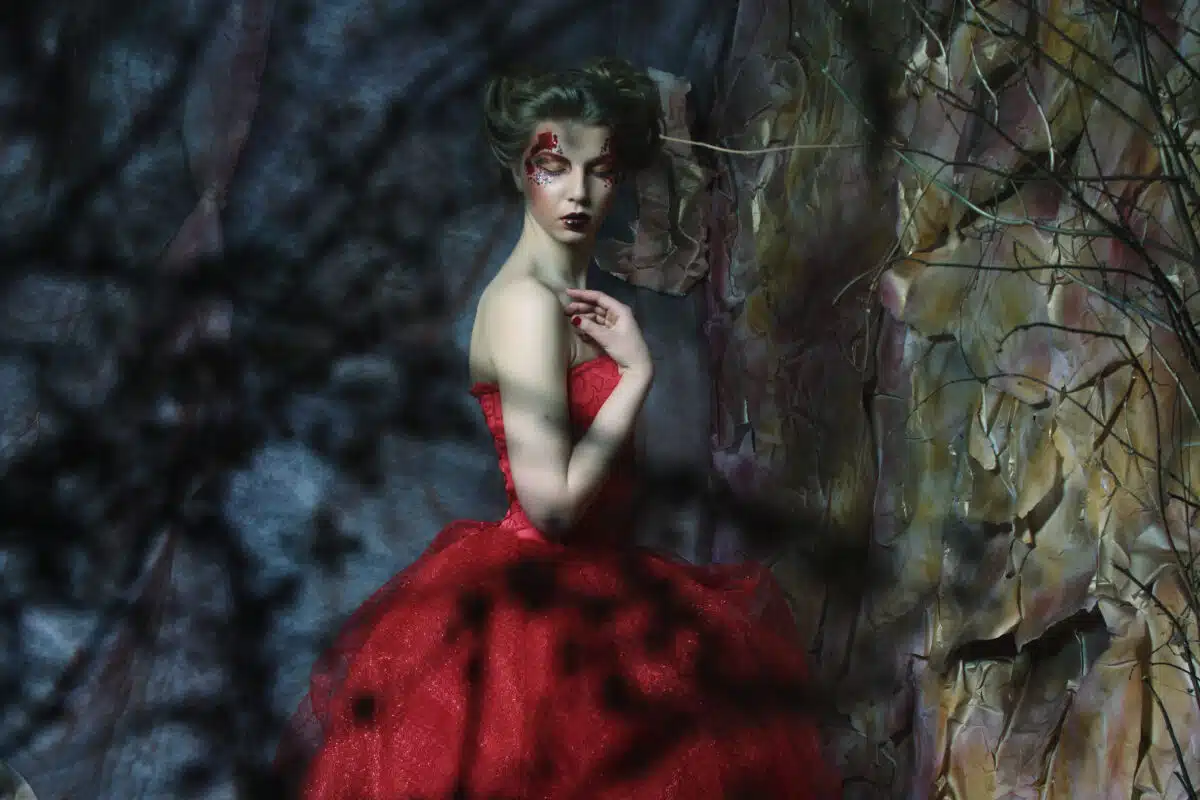
“The Mystery” by Paul Laurence Dunbar
I was not; now I am—a few days hence
I shall not be; I fain would look before
And after, but can neither do; some Power
Or lack of power says “no” to all I would.
I stand upon a wide and sunless plain,
Nor chart nor steel to guide my steps aright.
Whene’er, o’ercoming fear, I dare to move,
I grope without direction and by chance.
Some feign to hear a voice and feel a hand
That draws them ever upward thro’ the gloom.
But I—I hear no voice and touch no hand,
Tho’ oft thro’ silence infinite I list,
And strain my hearing to supernal sounds;
Tho’ oft thro’ fateful darkness do I reach,
And stretch my hand to find that other hand.
I question of th’ eternal bending skies
That seem to neighbor with the novice earth;
But they roll on, and daily shut their eyes
On me, as I one day shall do on them,
And tell me not the secret that I ask.
“Sonnet” by Joseph Horatio Chant
Each human life with mysteries is replete;
They press upon us in its early dawn,
And multiply apace as years roll on,
And at each turn we must their problems meet.
Reason is blind, and fails their end to see,
Misjudges God and gathers only woe,
And from this spring much turbid waters flow.
Only the pure in heart from doubt are free;
They read aright the writing on the wall
Which solves the problems of our earthly lot;
To them God draws aside the veil, and shows
The golden threads with which the garment glows,
And why one dwells in palace, one in cot,
And how His love is working good to all.
“Zeila, A Story from a Star” by Abram Joseph Ryan
From the mystic sidereal spaces,
In the noon of a night ‘mid of May,
Came a spirit that murmured to me —
Or was it the dream of a dream?
No! no! from the purest of places,
Where liveth the highest of races,
In an unfallen sphere far away
(And it wore Immortality’s gleam)
Came a Being. Hath seen on the sea
The sheen of some silver star shimmer
‘Thwart shadows that fall dim and dimmer
O’er a wave half in dream on the deep?
It shone on me thus in my sleep.
Was I sleeping? Is sleep but the closing,
In the night, of our eyes from the light?
Doth the spirit of man e’en then rest?
Or doth it not toil all the more?
When the earth-wearied frame is reposing,
Is the vision then veiled the less bright?
When the earth from our sight hath been taken,
The fetters of senses off shaken,
The soul, doth it not then awaken
To the light on Infinity’s shore?
And is not its vision then best,
And truest, and farthest, and clearest?
In night, is not heaven the nearest?
Ah, me! let the day have his schemers,
Let them work on their ways as they will,
And their workings, I trow, have their worth.
But the unsleeping spirits of dreamers,
In hours when the world-voice is still,
Are building, with faith without falter,
Bright steps up to heaven’s high altar,
Where lead all the aisles of the earth.
Was I sleeping? I know not — or waking?
The body was resting, I ween;
Meseems it was o’ermuch tired
With the toils of the day that had gone;
When sudden there came the bright breaking
Of light thro’ a shadowy screen;
And with the brightness there blended
The voice of the Being descended
From a star ever pure of all sin,
In music too sweet to be lyred
By the lips of the sinful and mortal.
And, oh! how the pure brightness shone!
As shines thro’ the summer morn’s portal
Rays golden and white as the snow,
As white as the flakes — ah, no! whiter;
Only angelic wings may be brighter
When they flash o’er the brow of some woe
That walketh this shadowed below.
The soul loseth never its seeing,
In the goings of night and of day
It graspeth the Infinite Far.
No wonder there may come some Being,
As if it had wandered astray
At times down the wonder-filled way —
As to me in the midnight of May —
From its home in some glory-crowned star,
Where evil hath never left traces;
Where dwelleth the highest of races,
Save the angels that circle the throne,
In a grace far beyond all our graces,
Whose Christ is the same as our own.
Yea! I ween the star spaces are teeming
With the gladness of life and of love.
No! no! I am not at all dreaming —
The Below’s hands enclasp the Above.
‘Tis a truth that is more than a seeming —
Creation is many, tho’ one,
And we are the last of its creatures.
This earth bears the sign of our sin
(From the highest the evil came in);
Yet ours are the same human features
That veiled long agone the Divine.
How comes it, O holy Creator!
That we, not the first, but the latter
Of varied and numberless beings
Springing forth in Thy loving decreeings,
That we are, of all, the most Thine?
Yea! we are the least and the lowly,
The half of our history gone,
We look up the Infinite slope
In faith, and we walk on in hope;
But think ye from here to the ” Holy
Of Holies ” beyond yon still sky,
O’er the stars that forever move on,
I’ the heavens beyond the bright Third,
In glory’s ineffable light;
Where the Father, and Spirit, and Word
Reign circled by angels all bright —
Ah! think you ‘tween Here and that Yonder
There is naught but the silence of death?
There’s naught of love’s wish or life’s wonder,
And naught but an infinite night?
No! no! the great Father is fonder
Of breathing His life-giving breath
Into beings of numberless races.
And from here on and up to His throne
The Trinity’s beautiful faces,
In countlessly various traces,
Are seen in more stars than our own.
This earth telleth not half the story
Of the infinite heart of our God —
The heavens proclaim of His glory
The least little part, and His power
Broke not its sceptre when earth
Was beckoned by Him into birth.
Is He resting, I wonder, to-night?
Can He rest when His love sways His will?
Will He rest ere His glory shall fill
All spaces below and above
With beings to know and to love?
Creation — when was it begun?
Who knows its first day? Nay, none.
And then, what ken among men
Can tell when the last work is done?
Is He resting, I wonder, to-night?
Doth He ever grow weary of giving
To Darknesses rays of His light?
Doth He ever grow weary of giving
To Nothings the rapture of living
And waiting awhile for His sight?
If His will rules His glorious power,
And if love sways His beautiful will,
Is He not, e’en in this very hour,
Going on with love’s wonder-work still?
Let me pray just awhile, for betimes
My spirit is clouded; and then
Strange darknesses creep o’er my rhymes,
Till prayer lendeth light to my pen.
And then shall I better unfold
The story to me that was told,
Of the unfallen star far away,
In the noon of the night ‘mid of May,
By the beautiful Being who came,
With the pure and the beautiful name.
” Call me Zeila, ” the bright spirit said,
And passed from my vision afar.
With rapture I bowed down my head,
And dreamed of that unfallen star.
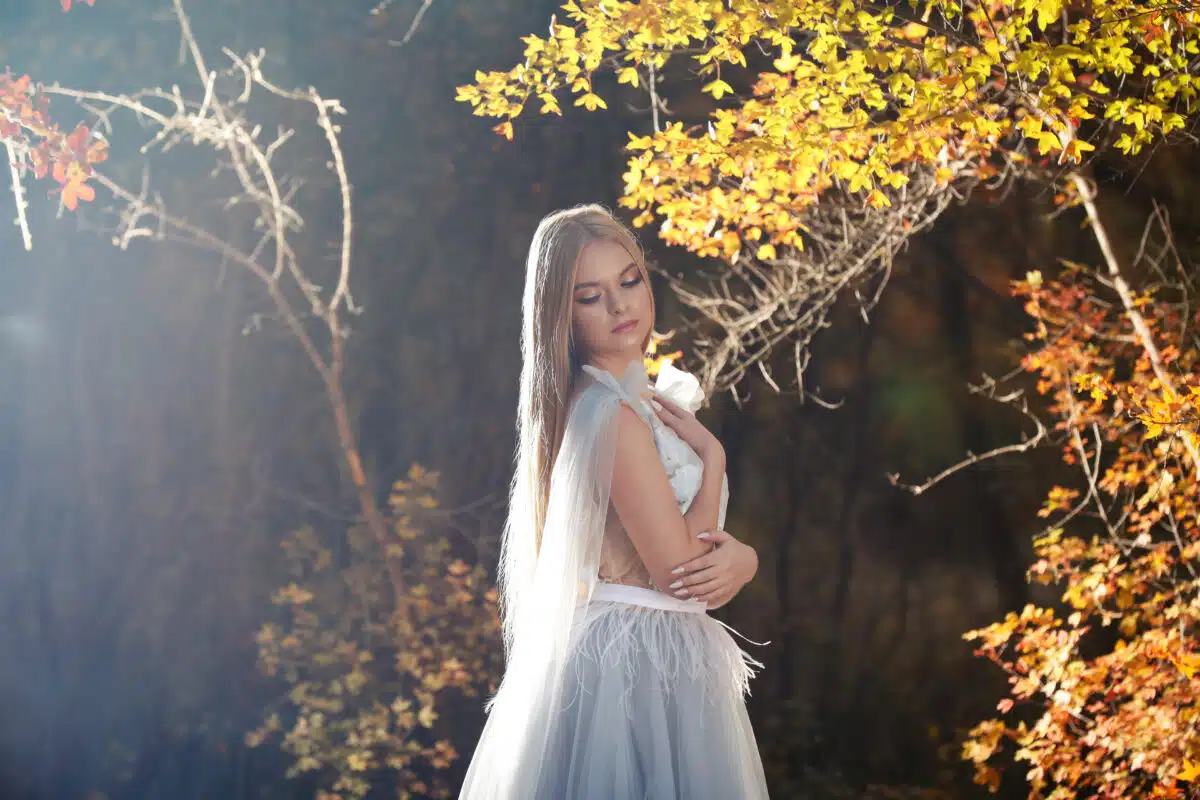
“The Mystery” by Gilbert Keith Chesterton
If sunset clouds could grow on trees
It would but match the may in flower;
And skies be underneath the seas
No topsyturvier than a shower.
If mountains rose on wings to wander
They were no wilder than a cloud;
Yet all my praise is mean as slander,
Mean as these mean words spoken aloud.
And never more than now I know
That man’s first heaven is far behind;
Unless the blazing seraph’s blow
Has left him in the garden blind.
Witness, O Sun that blinds our eyes,
Unthinkable and unthankable King,
That though all other wonder dies
I wonder at not wondering.
“The Mystery” by Charles Sangster
My mind is like a troubled sea
O’er which the winds forever sweep;
Within its depths, eternally,
My being’s pulses throb and leap;
There germs of contemplation sleep,
Like stars beyond the Milky Way, –
Like pearls within the gloomy deep,
That never saw the light of day.
Oh, wondrous mind, how little known!
Whence comes the thought that through my brain
Floats weirdlike as the pleasing tone
That quickens a belovë”d strain?
It may have graced some sweet refrain
A thousand years ago, or more;
Some Norman Prince, some valiant Dane,
May have imbibed it with their lore.
It may have strengthened Plato’s soul,
Its clarion echoes ringing through
His brain, the heaven-reaching goal
Whence wisdom had its starry view;
It may have cheered the gifted few
Whose minds were mints of royal song,
Who toiled where Shakespeare soared, and drew
Down blessings from the grateful throng.
And on for ages yet to come,
Through minds by heavenly impulse fired,
That thought may strike some scorner dumb,
In all its regal guise attired;
Divinely blest, though uninspired,
Some soul may change its swift career,
Bearing the great truth, long-desired,
In triumph to the highest sphere.
Unbounded universe of Thought!
Illimitable realms of mind!
Regions of Fancy, wonder-fraught!
Imagination unconfined!
Temples of mystery! behind
Whose veils the God-appointed plan
In perfect wisdom is enshrined,
Beyond the pigmy reach of man:
I cannot – dare not – seek to know
What finite vision, to the end,
Through years of strictest search below,
Must ever fail to comprehend!
God! whose intents so far transcend
Our poor discernment, let me see
Some portion of the truths that tend
By slow gradations up to Thee:
That in the less imperfect years,
When human frailty shall have died,
When the vexed riddle of the spheres,
Interpreted and glorified,
Shall be as nothing to the tide
Of light in which Thy hidden ways
Will be revealed: I may abide
Thy meanest instrument of praise,
And from the broad calm ocean of Thy truth
And wisdom drinking, find eternal youth.
“Don Juan” by D. H. Lawrence
It is Isis the mystery
Must be in love with me.
Here this round ball of earth
Where all the mountains sit
Solemn in groups,
And the bright rivers flit
Round them for girth.
Here the trees and troops
Darken the shining grass,
And many people pass
Plundered from heaven,
Many bright people pass,
Plunder from heaven.
What of the mistresses,
What the beloved seven?
— They were but witnesses,
I was just driven.
Where is there peace for me?
Isis the mystery
Must be in love with me.

“An Enigma” by Edgar Allan Poe
“Seldom we find,” says Solomon Don Dunce,
“Half an idea in the profoundest sonnet.
Through all the flimsy things we see at once
As easily as through a Naples bonnet,
Trash of all trash! how can a lady don it?
Yet heavier far than your Petrarchan stuff,
Owl-downy nonsense that the faintest puff
Twirls into trunk-paper the while you con it.”
And, veritably, Sol is right enough.
The general tuckermanities are arrant
Bubbles, ephemeral and so transparent,
But this is, now, you may depend upon it,
Stable, opaque, immortal- all by dint
Of the dear names that he concealed within’t.
“The Open Door” by Alfred Noyes
O Mystery of life,
That, after all our strife,
Defeats, mistakes,
Just as, at last, we see
The road to victory,
The tired heart breaks.
Just as the long years give
Knowledge of how to live,
Life’s end draws near;
As if, that gift being ours,
God needed our new powers
In worlds elsewhere.
There, if the soul whose wings
Were won in suffering, springs
To life anew,
Justice would have some room
For hope beyond the tomb,
And mercy, too.
And since, without this dream
No light, no faintest gleam
Answers our ‘why’;
But earth and all its race
Must pass and leave no trace
On that blind sky;
Shall reason close that door
On all we struggled for,
Seal the soul’s doom;
Make of this universe
One wild answering curse,
One lampless tomb?
Mine be the dream, the creed
That leaves for God, indeed,
For God, and man,
One open door whereby
To prove His world no lie
And crown His plan.
“Mysteries” by Madison Julius Cawein
Soft and silken and silvery brown,
In shoes of lichen and leafy gown,
Little blue butterflies fluttering around her,
Deep in the forest, afar from town,
There where a stream came trickling down,
I met with Silence, who wove a crown
Of sleep whose mystery bound her.
I gazed in her eyes, that were mossy green
As the rain that pools in a hollow between
The twisted roots of a tree that towers:
And I saw the things that none has seen,
That mean far more than facts may mean,
The dreams, that are true, of an age that has been,
That God has thought into flowers.
I gazed on her lips, that were dewy gray
As the mist that clings, at the close of day,
To the wet hillside when the winds cease blowing;
And I heard the things that none may say,
That are holier far than the prayers we pray,
The murmured music God breathes alway
Through the hearts of all things growing.
Soft and subtle and vapory white,
In shoes of shadow and gown of light,
Crimson poppies asleep around her,
Far in the forest, beneath a height,
I came on Slumber, who wove from night
A wreath of silence, that, darkly bright,
With its mystic beauty bound her.
I looked in her face that was pale and still
As the moon that rises above the hill
Where the pines loom sombre as sorrow:
And the things that all have known and will,
I knew for a moment: the myths that fill
And people the past of the soul and thrill
Its hope with a far to-morrow.
I heard her voice, that was strange with pain
As a wind that whispers of wreck and rain
To the leaves of the autumn rustling lonely:
And I felt the things that are felt in vain
By all the longings that haunt the brain
Of man, that come and depart again
And are part of his dreamings only.
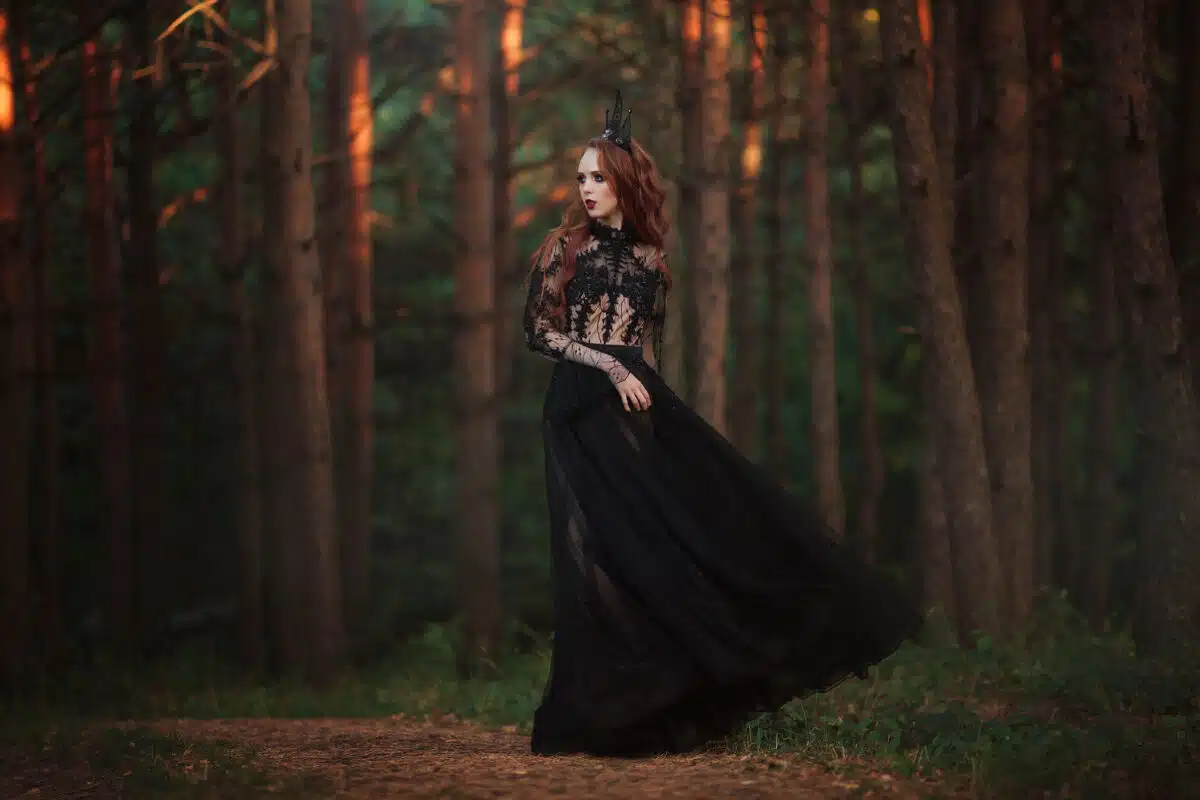
“Alone” by Edgar Allan Poe
From childhood’s hour I have not been
As others were—I have not seen
As others saw—I could not bring
My passions from a common spring—
From the same source I have not taken
My sorrow—I could not awaken
My heart to joy at the same tone—
And all I lov’d—I lov’d alone—
Then—in my childhood—in the dawn
Of a most stormy life—was drawn
From ev’ry depth of good and ill
The mystery which binds me still—
From the torrent, or the fountain—
From the red cliff of the mountain—
From the sun that ‘round me roll’d
In its autumn tint of gold—
From the lightning in the sky
As it pass’d me flying by—
From the thunder, and the storm—
And the cloud that took the form
(When the rest of Heaven was blue)
Of a demon in my view—
“A Mystery Explained” by Clara A. Merrill
Hi Sambo—don’ yo’ talk dat way—
Aint yo’ a silly coon!
A talkin’ ’bout de mystery
Ob de man dats in de moon!
I tell yo’ ’taint no mystery
’Bout de moon, or how it acts,
I reckon ef yo’d like to know
I kin tell yo’ all de facts.
’Tis dis:—Yo’ see when de world was new
De moon was roun’ an’ clear;
An’ kep’ a shinin’ ebery night
Jus’ so, year arter year.—
’Till dis man he done some drefful t’ing—
He ran, but dey cotched him soon
An’ widout no odds dey banished him
An’ sent him to de moon.
Dey see’d him lookin’ down to earth
Whar dey wouldn’t let him stay;
Den solemn like, an’ bery slow
He turn he face away.—
An’ arter dat de moon was new—
Den half a moon dar’ll be;
Den de moon am roun’, an’ de man looks down
On de lan’ an’ on de sea.
An’ he gazes ober all de earth
’Til he wants to see no more—
Den he slowly turn he face away
Jus’ as he did before.
Dese am de facts ob what yo’ call
De “Mystery profound”—
When de moon keeps changing as yo’ see
’Tis de man a turnin’ round!
“Gitanjali 71” by Rabindranath Tagore
That I should make much of myself
and turn it on all sides, thus casting
coloured shadows on thy radiance––
such is thy maya.
Thou settest a barrier in thine own
being and then callest thy severed self
in myriad notes. This thy self-separa-
tion has taken body in me.
The poignant song is echoed through
all the sky in many-coloured tears and
smiles, alarms and hopes; waves rise up
and sink again, dreams break and form.
In me is thy own defeat of self.
This screen that thou hast raised is
painted with innumerable figures with
the brush of the night and the day.
Behind it thy seat is woven in wondrous
mysteries of curves, casting away all
barren lines of straightness.
The great pageant of thee and me
has overspread the sky. With the
tune of thee and me all the air is
vibrant, and all ages pass with the hid-
ing and seeking of thee and me.
Poems About Mystery and Love
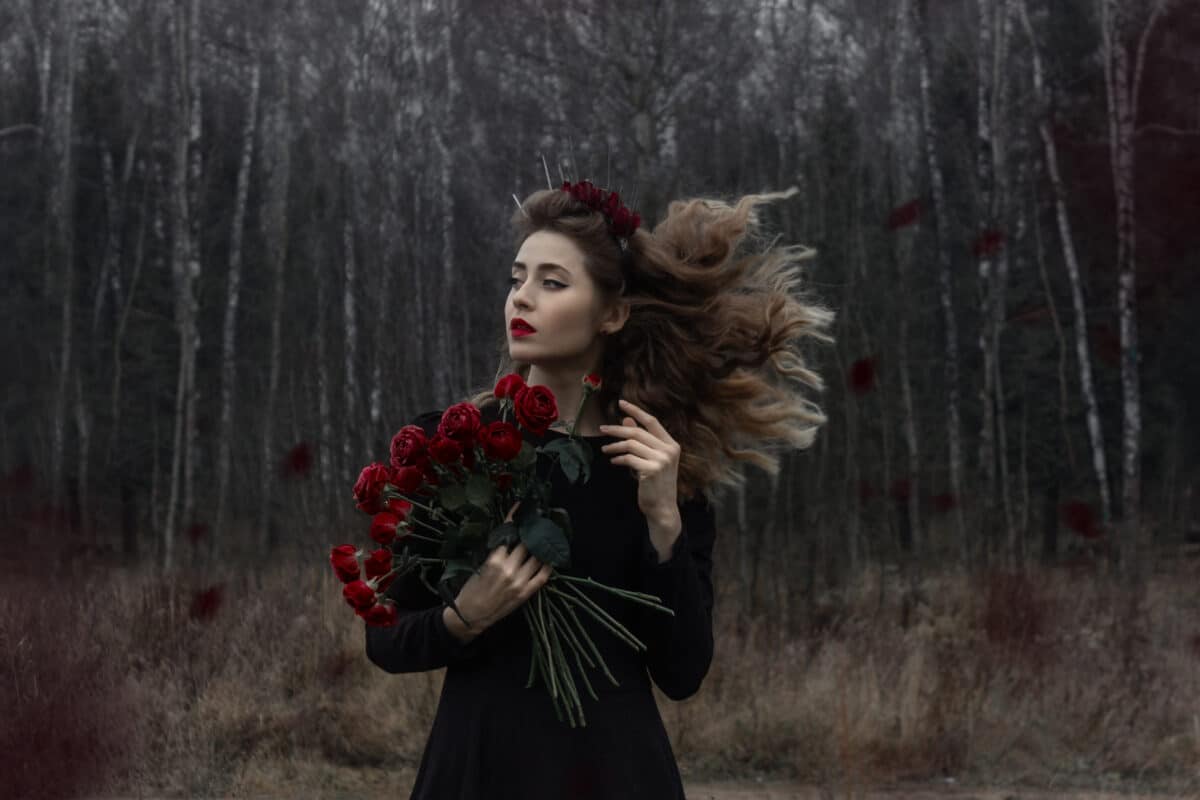
“Secrecy Protested” by Thomas Carew
Fear not, dear love, that I’ll reveal
Those hours of pleasure we two steal ;
No eye shall see, nor yet the sun
Descry, what thou and I have done.
No ear shall hear our love, but we
Silent as the night will be ;
The god of love himself (whose dart
Did first wound mine and then thy heart),
Shall never know that we can tell
What sweets in stol’n embraces dwell.
This only means may find it out ;
If, when I die, physicians doubt
What caused my death, and there to view
Of all their judgements which was true,
Rip up my heart, oh ! then, I fear,
The world will see thy picture there.
“Mystery” by Charles Stuart Calverley
I know not if in others’ eyes
She seem’d almost divine;
But far beyond a doubt it lies
That she did not in mine.
Each common stone on which she trod
I did not deem a pearl:
Nay it is not a little odd
How I abhorr’d that girl.
We met at balls and picnics oft,
Or on a drawingroom stair;
My aunt invariably cough’d
To warn me she was there:
At croquet I was bid remark
How queenly was her pose,
As with stern glee she drew the dark
Blue ball beneath her toes,
And made the Red fly many a foot:
Then calmly she would stoop,
Smiling an angel smile, to put
A partner through his hoop.
At archery I was made observe
That others aim’d more near.
But none so tenderly could curve
The elbow round the ear:
Or if we rode, perhaps she DID
Pull sharply at the curb;
But then the way in which she slid
From horseback was superb!
She’d throw off odes, again, whose flow
And fire were more than Sapphic;
Her voice was sweet, and very low;
Her singing quite seraphic:
She WAS a seraph, lacking wings.
That much I freely own.
But, it is one of those queer things
Whose cause is all unknown –
(Such are the wasp, the household fly,
The shapes that crawl and curl
By men called centipedes) – that I
Simply abhorred that girl.
No doubt some mystery underlies
All things which are and which are not:
And ’tis the function of the Wise
Not to expound to us what is what,
But let his consciousness play round
The matter, and at ease evolve
The problem, shallow or profound,
Which our poor wits have fail’d to solve,
Then tell us blandly we are fools;
Whereof we were aware before:
That truth they taught us at the schools,
And p’raps (who knows?) a little more.
But why did we two disagree?
Our tastes, it may be, did not dovetail:
All I know is, we ne’er shall be
Hero and heroine of a love-tale.
“Ballade Of Woman” by Richard Le Gallienne
A woman! lightly the mysterious word
Falls from our lips, lightly as though we knew
Its meaning, as we say—a flower, a bird,
Or say the moon, the stream, the light, the dew,
Simple familiar things, mysterious too;
Or as a star is set down on a chart,
Named with a name, out yonder in the blue:
A woman—and yet how much more thou art!
So lightly spoken, and so lightly heard,
And yet, strange word, who shall thy sense construe?
What sage hath yet fit designation dared?
Yet I have sought the dictionaries through,
And of thy meaning found me not a clue;
Blessing and breaking still the firmest heart,
So fairy false, yet so divinely true:
A woman—and yet how much more thou art!
Mother of God, and Circe, bosom-bared,
That nursed our manhood, and our manhood slew;
First dream, last sigh, all the long way we fared,
Sweeter than honey, bitterer than rue;
Thou fated radiance sorrowing men pursue,
Thou art the whole of life—the rest but part
Of thee, all things we ever dream or do;
A woman—and yet how much more thou art!
ENVOI
Princess, that all this craft of moonlight threw
Across my path, this deep immortal smart
Shall still burn on when winds my ashes strew:
A woman—and yet how much more thou art!
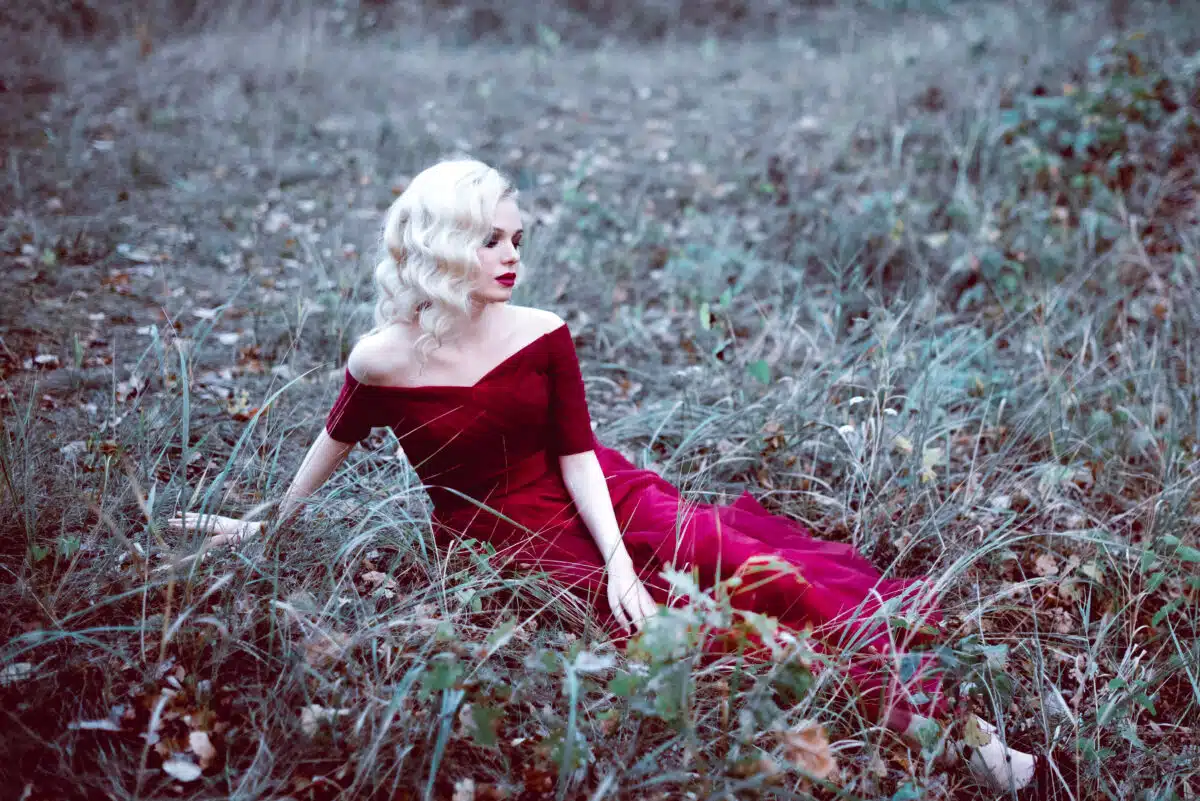
“April Romance” by Ernest Rhys
I saw the sunlight in a leafy place
Bathing itself in liquid green and amber,
Where every flower had tears hid in its petals,
And every leaf was lovely with the rain.
With wondering eyes I saw how leaf and flower
Held up their hands, and trembled with delight,
While on the gleaming bough the alighting bird
Shook its wet wings like something fresh from heaven.
And when it sang, it told how earth to heaven
Was turned; and how the miracle of morning
Had made of leaf and flower a deathless maiden
To be my mate and teach eternity.
She took my hand: I understood each thing
The leaf says to the flower when, both adoring,
See like themselves, leaf-shaped and flower-painted,
The sun descend, to bathe in painted shade.
She led me out—we left the leafy croft,
And its wet fragrance, for the treeless town;
But she picked up a dead leaf in the mud,
And she found flowers in the children’s hair.
Then she was gone—and I am seeking her:
And every time at evening when it rains,
And every time at morning, when the sun
Bathes in the beauty of that leafy place,
Or when he looks into an urchin’s eyes
To see if April tears or smiles are there,
And the wet dust scents summer leagues away,
I hold my breath—the Eternal Maid returns.
“Guess, Guess” by Thomas Moore
I love a maid, a mystic maid,
Whose form no eyes but mine can see;
She comes in light, she comes in shade,
And beautiful in both is she.
Her shape in dreams I oft behold,
And oft she whispers in my ear
Such words as when to others told,
Awake the sigh, or wring the tear;
Then guess, guess, who she,
The lady of my love, may be.
I find the lustre of her brow,
Come o’er me in my darkest ways;
And feel as if her voice, even now,
Were echoing far off my lays.
There is no scene of joy or woe
But she doth gild with influence bright;
And shed o’er all so rich a glow
As makes even tears seem full of light:
Then guess, guess, who she,
The lady of my love, may be.
“Mystery” by D. H. Lawrence
Now I am all
One bowl of kisses,
Such as the tall
Slim votaresses
Of Egypt filled
For a God’s excesses.
I lift to you
My bowl of kisses,
And through the temple’s
Blue recesses
Cry out to you
In wild caresses.
And to my lips’
Bright crimson rim
The passion slips,
And down my slim
White body drips
The shining hymn.
And still before
The altar I
Exult the bowl
Brimful, and cry
To you to stoop
And drink, Most High.
Oh drink me up
That I may be
Within your cup
Like a mystery,
Like wine that is still
In ecstasy.
Glimmering still
In ecstasy,
Commingled wines
Of you and me
In one fulfill
The mystery.
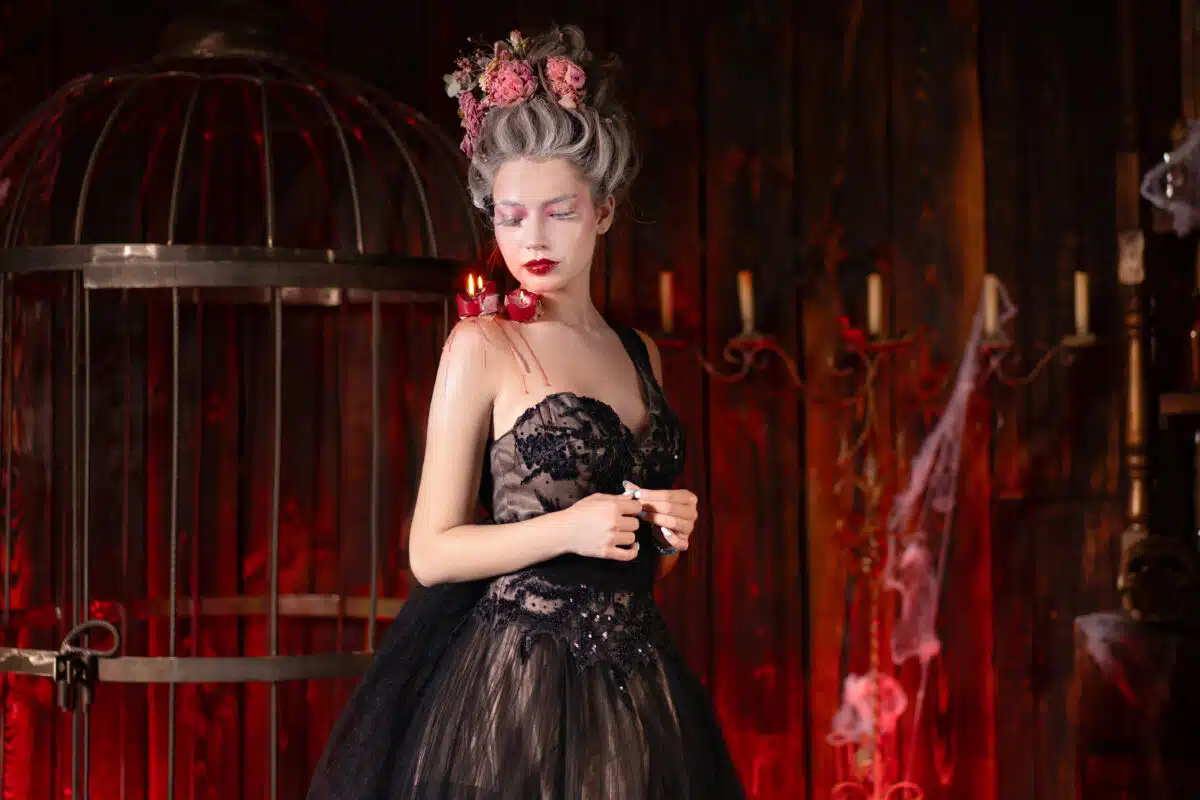
“Adeline” by Alfred Lord Tennyson
I
Mystery of mysteries,
Faintly smiling Adeline,
Scarce of earth nor all divine,
Nor unhappy, nor at rest,
But beyond expression fair
With thy floating flaxen hair;
Thy rose-lips and full blue eyes
Take the heart from out my breast.
Wherefore those dim looks of thine,
Shadowy, dreaming Adeline?
II
Whence that aery bloom of thine,
Like a lily which the sun
Looks thro’ in his sad decline,
And a rose-bush leans upon,
Thou that faintly smilest still,
As a Naïad in a well,
Looking at the set of day,
Or a phantom two hours old
Of a maiden passed away,
Ere the placid lips be cold?
Wherefore those faint smiles of thine,
Spiritual Adeline?
III
What hope or fear or joy is thine?
Who talketh with thee, Adeline?
For sure thou art not all alone:
Do beating hearts of salient springs
Keep measure with thine own?
Hast thou heard the butterflies
What they say betwixt their wings?
Or in stillest evenings
With what voice the violet woos
To his heart the silver dews?
Or when little airs arise,
How the merry bluebell rings
To the mosses underneath?
Hast thou look’d upon the breath
Of the lilies at sunrise?
Wherefore that faint smile of thine,
Shadowy, dreaming Adeline?
IV
Some honey-converse feeds thy mind,
Some spirit of a crimson rose
In love with thee forgets to close
His curtains, wasting odorous sighs
All night long on darkness blind.
What aileth thee? whom waitest thou
With thy soften’d, shadow’d brow,
And those dew-lit eyes of thine,
Thou faint smiler, Adeline?
V
Lovest thou the doleful wind
When thou gazest at the skies?
Doth the low-tongued Orient
Wander from the side of the morn,
Dripping with Sabæan spice
On thy pillow, lowly bent
With melodious airs lovelorn,
Breathing Light against thy face,
While his locks a-dropping twined
Round thy neck in subtle ring
Make a carcanet of rays,
And ye talk together still,
In the language wherewith Spring
Letters cowslips on the hill?
Hence that look and smile of thine,
Spiritual Adeline.
“Annabel Lee” by Edgar Allan Poe
It was many and many a year ago,
In a kingdom by the sea,
That a maiden there lived whom you may know
By the name of ANNABEL LEE;
And this maiden she lived with no other thought
Than to love and be loved by me.
I was a child and she was a child,
In this kingdom by the sea;
But we loved with a love that was more than love,
I and my Annabel Lee;
With a love that the winged seraphs of heaven
Coveted her and me.
And this was the reason that, long ago,
In this kingdom by the sea,
A wind blew out of a cloud, chilling
My beautiful Annabel Lee;
So that her highborn kinsman came
And bore her away from me,
To shut her up in a sepulchre
In this kingdom by the sea.
The angels, not half so happy in heaven,
Went envying her and me,
Yes!, that was the reason (as all men know,
In this kingdom by the sea)
That the wind came out of the cloud by night,
Chilling and killing my Annabel Lee.
But our love it was stronger by far than the love
Of those who were older than we,
Of many far wiser than we,
And neither the angels in heaven above,
Nor the demons down under the sea,
Can ever dissever my soul from the soul
Of the beautiful Annabel Lee.
For the moon never beams without bringing me dreams
Of the beautiful Annabel Lee;
And the stars never rise but I feel the bright eyes
Of the beautiful Annabel Lee;
And so, all the night-tide, I lie down by the side
Of my darling, my darling, my life and my bride,
In the sepulchre there by the sea,
In her tomb by the sounding sea.
Poems About Mystery and Suspense
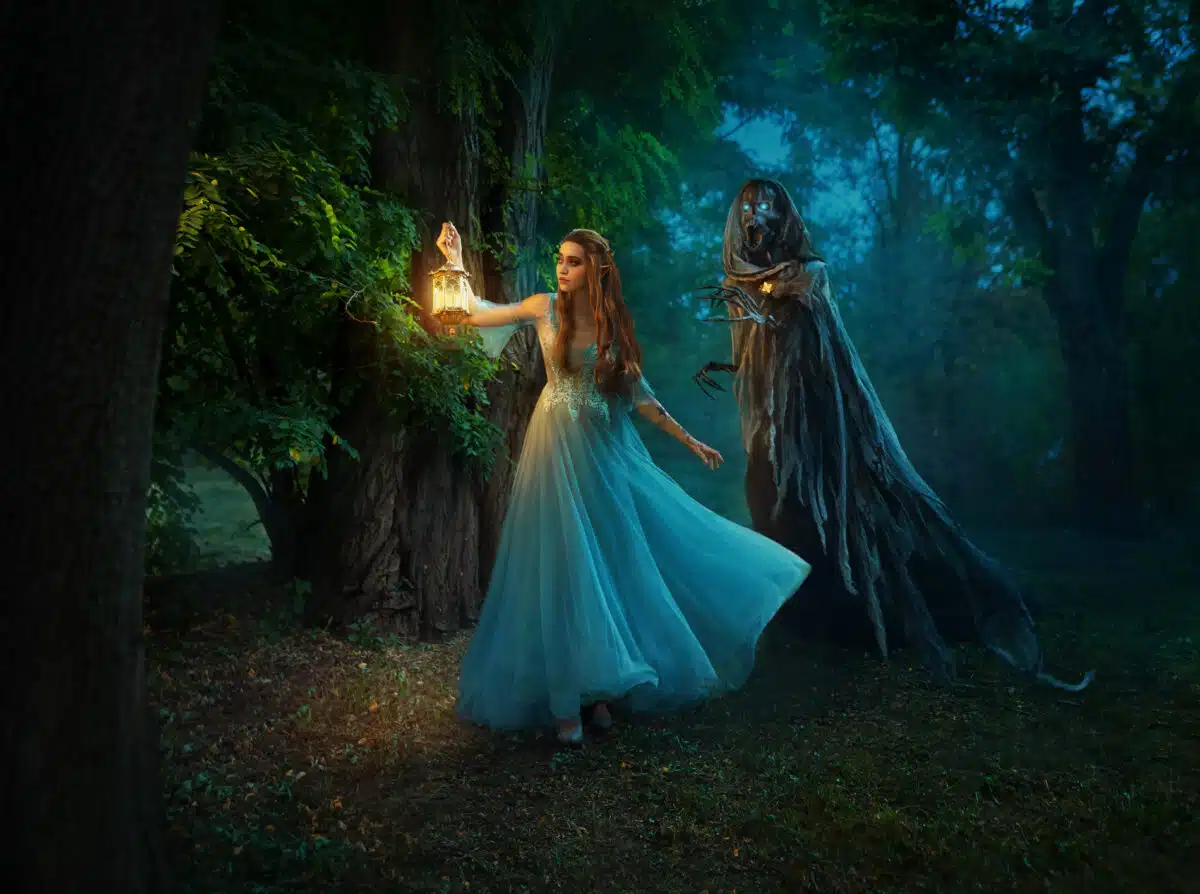
“The Mystery of Gilgal” by John Hay
The darkest, strangest mystery
I ever read, or heern, or see,
Is ‘long of a drink at Taggart’s Hall,
Tom Taggart’s of Gilgal.
I’ve heern the tale a thousand ways,
But never could git through the maze
That hangs around that queer day’s doin’s;
But I’ll tell the yarn to youans.
Tom Taggart stood behind his bar,
The time was fall, the skies was fa’r,
The neighbors round the counter drawed,
And ca’mly drinked and jawed.
At last come Colonel Blood of Pike,
And old Jedge Phinn, permiscus-like,
And each, as he meandered in,
Remarked, “A whisky-skin.”
Tom mixed the beverage full and fa’r,
And slammed it, smoking, on the bar.
Some says three fingers, some says two,-
I’ll leave the choice to you.
Phinn to the drink put forth his hand;
Blood drawed his knife, with accent bland,
“I ax yer parding, Mister Phinn-
Jest drap that whisky-skin.”
No man high-toneder could be found
Than old Jedge Phinn the country round.
Says he, “Young man, the tribe of Phinns
Knows their own whisky-skins!”
He went for his ‘leven-inch bowie-knife:
“I tries to foller a Christian life;
But I’ll drap a slice of liver or two,
My bloomin’ shrub, with you.”
They carved in a way that all admired,
Tell Blood drawed iron at last, and fired.
It took Seth Bludso ‘twixt the eyes,
Which caused him great surprise.
Then coats went off, and all went in;
Shots and bad language swelled the din;
The short, sharp bark of Derringers,
Like bull-pups, cheered the furse.
They piled the stiffs outside the door;
They made, I reckon, a cord or more.
Girls went that winter, as a rule,
Alone to spellin’-school.
I’ve sarched in vain, from Dan to Beer-
Sheba, to make this mystery dear;
But I end with hit as I did begin,
“Who gotthe Whisky-skin?”
“Tenants” by Wilfrid Wilson Gibson
Suddenly, out of dark and leafy ways,
We came upon the little house asleep
In cold blind stillness, shadowless and deep,
In the white magic of the full moon-blaze:
Strangers without the gate, we stood agaze,
Fearful to break that quiet, and to creep
Into the home that had been ours to keep
Through a long year of happy nights and days.
So unfamiliar in the white moon-gleam,
So old and ghostly like a house of dream
It stood, that over us there stole the dread
That even as we watched it, side by side,
The ghosts of lovers, who had lived and died
Within its walls, were sleeping in our bed.
“Ecce in Deserto” by Henry Augustin Beers
The wilderness a secret keeps
Upon whose guess I go:
Eye hath not seen, ear hath not heard;
And yet I know, I know,
Some day the viewless latch will lift,
The door of air swing wide
To one lost chamber of the wood
Where those shy mysteries hide,
One yet unfound, receding depth,
From which the wood-thrush sings,
Still luring in to darker shades,
In in to colder springs.
There is no wind abroad to-day.
But hark! the pine-tops’ roar,
That sleep and in their dreams repeat
The music of the shore.
What wisdom in their needles stirs?
What song is that they sing?
Those airs that search the forest’s heart,
What rumor do they bring?
A hushed excitement fills the gloom,
And, in the stillness, clear
The vireo’s tell-tale warning rings:
“‘Tis near ’tis near ’tis near!”
As, in the fairy-tale, more loud
The ghostly music plays
When, toward the enchanted bower, the prince
Draws closer through the maze.
Nay nay. I track a fleeter game,
A wilder than ye know,
To lairs beyond the inmost haunt
Of thrush or vireo.
This way it passed: the scent lies fresh;
The ferns still lightly shake.
Ever I follow hard upon,
But never overtake.
To other woods the trail leads on,
To other worlds and new,
Where they who keep the secret here
Will keep the promise too.
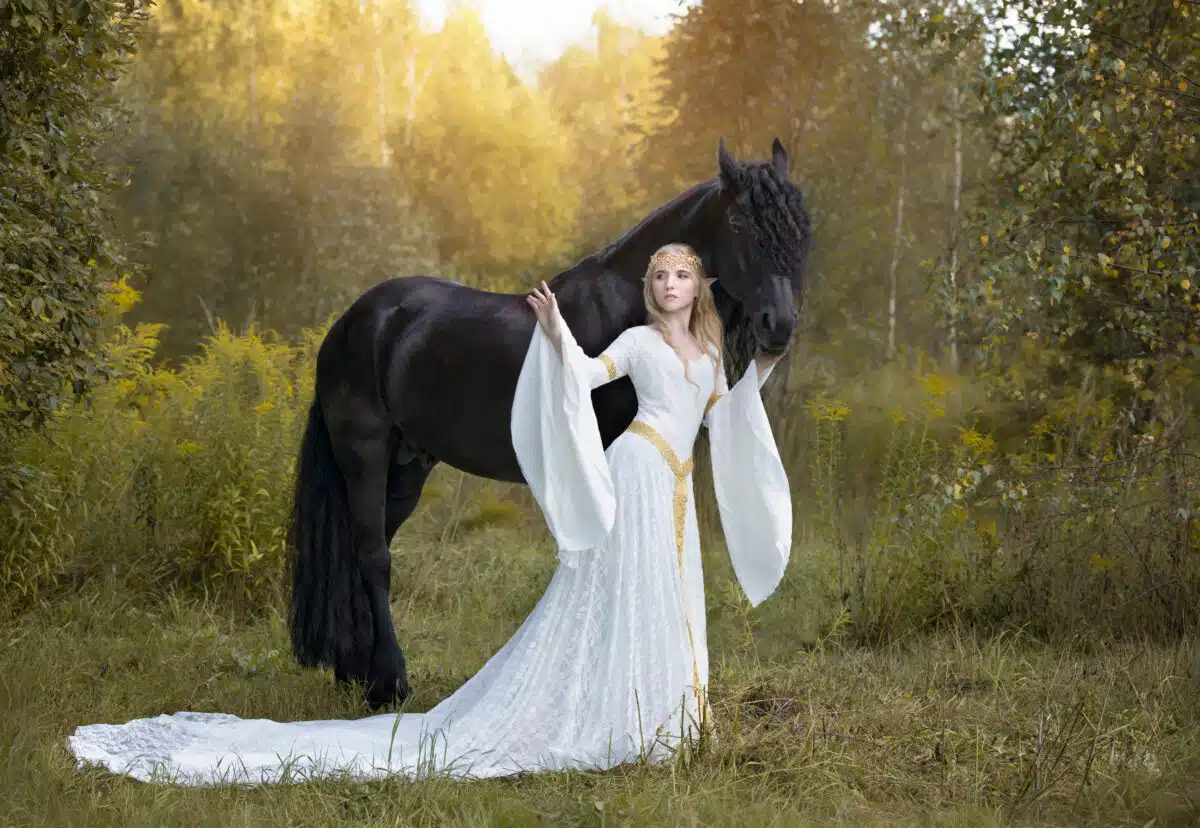
“To Mystery Land” by Kate Greenaway
Oh, dear, how will it end?
Peggy and Susie how naughty you are.
You little know where you are,
Going so far, and so high,
Nearly up to the sky.
Perhaps it’s a Giant who lives there,
And perhaps it’s a lovely Princess.
But you very well know
You’ve no business to go;
You’ll get yourselves into a mess.
Oh, dear, I’m sure it is true;
Whatever on earth can it matter to you?
For you know it–oh, fie–
That it’s naughty to pry
Into other’s affairs–
Into other folks houses to go,
Where you know
You’re not asked.
So you’d better come back
While there’s time, it is plain.
Go home–and be never
So naughty again.
“Secrecy” by G. O. Warren
Down the hushed corridors of your dim soul
Lonely I go, and, yearning, pause by each closed door.
They stand so blind, indifferent, while no sound,
No breath escapes to tell me of your more,
Your less; immensities or nothingness.
But there is one apart, close-barred and rusted in,
Shrouded by years, your hand has never moved
To open. Have you heaven in there, or sin?
From all the other secrecies in you,
Despairing, I return to this, and weep and lean….
Here terror of your hiding burns like fire,
The doubt of what will be—and what has been.
“Faces” by William Stanley Braithwaite
Four faces in the dark,
Eight eyes aglow
With the pale lunar spark
Fireflies do show.
Four brows, specter-white,
Crowned with lambent hair;—
Only in the blackest night
Are these things there.
Eight lips that question me,
Moving to and fro;
Quiet as shadows be
On new-fallen snow.
Eight hands beckoning,
Spindrift of the wind;—
Past all mortal reckoning
Are phantoms of the mind.
Deep, return to deep again,
And old dreams fade.
Children, let me sleep again,
Calm and unafraid.
The Outlook
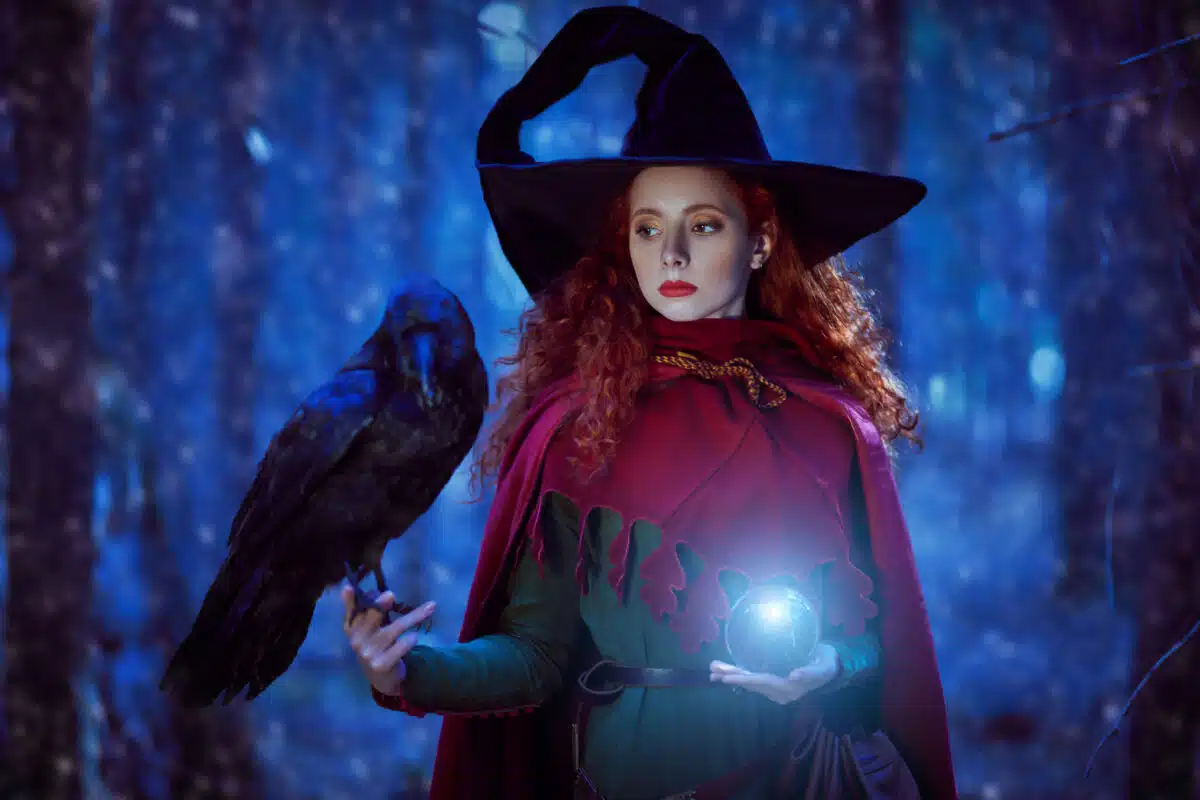
“The Raven” by Edgar Allan Poe
Once upon a midnight dreary, while I pondered, weak and weary,
Over many a quaint and curious volume of forgotten lore—
While I nodded, nearly napping, suddenly there came a tapping,
As of some one gently rapping—rapping at my chamber door.
“‘Tis some visitor,” I muttered, “tapping at my chamber door—
Only this and nothing more.”
Ah, distinctly I remember, it was in the bleak December,
And each separate dying ember wrought its ghost upon the floor.
Eagerly I wished the morrow;—vainly I had sought to borrow
From my books surcease of sorrow—sorrow for the lost Lenore—
For the rare and radiant maiden whom the angels name Lenore—
Nameless here for evermore.
And the silken sad uncertain rustling of each purple curtain
Thrilled me—filled me with fantastic terrors never felt before;
So that now, to still the beating of my heart, I stood repeating
“‘Tis some visitor entreating entrance at my chamber door—
Some late visitor entreating entrance at my chamber door;—
This it is and nothing more.”
Presently my soul grew stronger; hesitating then no longer,
“Sir,” said I, “or Madam, truly your forgiveness I implore;
But the fact is I was napping, and so gently you came rapping,
And so faintly you came tapping—tapping at my chamber door,
That I scarce was sure I heard you”—here I opened wide the door:—
Darkness there and nothing more.
Deep into that darkness peering, long I stood there wondering, fearing,
Doubting, dreaming dreams no mortal ever dared to dream before;
But the silence was unbroken, and the darkness gave no token,
And the only word there spoken was the whispered word, “Lenore!”
This I whispered, and an echo murmured back the word, “Lenore!”
Merely this and nothing more.
Back into the chamber turning, all my soul within me burning,
Soon I heard again a tapping, somewhat louder than before.
“Surely,” said I, “surely that is something at my window lattice;
Let me see, then, what thereat is, and this mystery explore—
Let my heart be still a moment, and this mystery explore;—
‘Tis the wind and nothing more.”
Open here I flung the shutter, when, with many a flirt and flutter,
In there stepped a stately Raven of the saintly days of yore;
Not the least obeisance made he: not an instant stopped or stayed he;
But, with mien of lord or lady, perched above my chamber door-
Perched upon a bust of Pallas just above my chamber door—
Perched, and sat, and nothing more.
Then this ebony bird beguiling my sad fancy into smiling,
By the grave and stern decorum of the countenance it wore,
“Though thy crest be shorn and shaven, thou,” I said, “art sure no craven,
Ghastly grim and ancient Raven wandering from the Nightly shore—
Tell me what thy lordly name is on the Night’s Plutonian shore!”
Quoth the Raven, “Nevermore.”
Much I marvelled this ungainly fowl to hear discourse so plainly,
Though its answer little meaning—little relevancy bore;
For we cannot help agreeing that no living human being
Ever yet was blessed with seeing bird above his chamber door—
Bird or beast upon the sculptured bust above his chamber door,
With such name as “Nevermore.”
But the Raven, sitting lonely on that placid bust, spoke only
That one word, as if his soul in that one word he did outpour.
Nothing further then he uttered—not a feather then he fluttered—
Till I scarcely more than muttered, “Other friends have flown before—
On the morrow he will leave me, as my hopes have flown before.”
Then the bird said, “Nevermore.”
Startled at the stillness broken by reply so aptly spoken,
“Doubtless,” said I, “what it utters is its only stock and store,
Caught from some unhappy master whom unmerciful Disaster
Followed fast and followed faster till his songs one burden bore—
Till the dirges of his Hope the melancholy burden bore
Of ‘Never—nevermore.'”
But the Raven still beguiling all my sad soul into smiling,
Straight I wheeled a cushioned seat in front of bird and bust and door;
Then, upon the velvet sinking, I betook myself to linking
Fancy unto fancy, thinking what this ominous bird of yore—
What this grim, ungainly, ghastly, gaunt, and ominous bird of yore
Meant in croaking “Nevermore.”
This I sat engaged in guessing, but no syllable expressing
To the fowl whose fiery eyes now burned into my bosom’s core;
This and more I sat divining, with my head at ease reclining
On the cushion’s velvet lining that the lamp-light gloated o’er,
But whose velvet violet lining with the lamp-light gloating o’er,
She shall press, ah, nevermore!
Then, methought, the air grew denser, perfumed from an unseen censer
Swung by Seraphim whose foot-falls tinkled on the tufted floor.
“Wretch,” I cried, “thy God hath lent thee—by these angels he hath sent thee
Respite—respite and nepenthé from thy memories of Lenore!
Quaff, oh quaff this kind nepenthé, and forget this lost Lenore!”
Quoth the Raven, “Nevermore.”
“Prophet!” said I, “thing of evil!—prophet still, if bird or devil!—
Whether Tempter sent, or whether tempest tossed thee here ashore,
Desolate yet all undaunted, on this desert land enchanted—
On this home by Horror haunted—tell me truly, I implore—
Is there—is there balm in Gilead?—tell me—tell me, I implore!”
Quoth the Raven, “Nevermore.”
“Prophet!” said I, “thing of evil!—prophet still, if bird or devil!
By that Heaven that bends above us — by that God we both adore—
Tell this soul with sorrow laden if, within the distant Aidenn,
It shall clasp a sainted maiden whom the angels name Lenore —
Clasp a rare and radiant maiden whom the angels name Lenore.”
Quoth the Raven, “Nevermore.”
“Be that word our sign of parting, bird or fiend!” I shrieked, upstarting—
“Get thee back into the tempest and the Night’s Plutonian shore!
Leave no black plume as a token of that lie thy soul hath spoken!
Leave my loneliness unbroken!—quit the bust above my door!
Take thy beak from out my heart, and take thy form from off my door!”
Quoth the Raven, “Nevermore.”
And the Raven, never flitting, still is sitting, still is sitting
On the pallid bust of Pallas just above my chamber door;
And his eyes have all the seeming of a demon’s that is dreaming,
And the lamp-light o’er him streaming throws his shadow on the floor;
And my soul from out that shadow that lies floating on the floor
Shall be lifted—nevermore!
“The Mystic Isle Of The Land Of The North Wind.” by John Campbell
A land untamed, whose myriad isles
Are set in branching lakes that vein
Illimitable silent woods,
Voiceful in Fall, when their defiles,
Rich with the birch’s golden rain,
See winging past the wildfowl broods.
Blue channels seem its dented rocks,
So steeply smoothed, but crusted o’er
With rounded mosses, green and grey,
That oft a Southern coral mocks
Upon this Northern fir-clad shore,
‘Neath tufted copse on cape and bay.
Here sunshine from serener skies
Than Europe’s ocean-islands know
Ripens the berry for the bear,
And pierces where the beaver plies
His water-forestry, or slow
The moose seeks out a breezy lair.
The blaze scarce spangles bush or ferns,
But lights the white pine’s velvet fringe
And its dark Norway sister’s boughs;
At eve between their shadows burns
The lake, where shafts of crimson tinge
The savage war-flotilla’s prows.
Far circling round, these seem to shun
An isle more fair than all beside,
As if some lurking foe were there,
Although upon its heights the sun
Shines glorious, and its forest pride
Is fanned by summer’s joyous air.
For ‘mid these isles is one of fear,
And none may ever breathe its name.
There the Great Spirit loves to be;
Its haunted groves and waters clear
Are homes of thunder and of flame;
All pass it silently and flee,
Save they who potent magic learn,
Who lonely in that dreaded fane
Resist nine days the awful powers:
And, fasting, each through pain may earn
The knowledge daring mortals gain,
If life survive those secret hours!
“Mysterious Doings” by Eugene Field
As once I rambled in the woods
I chanced to spy amid the brake
A huntsman ride his way beside
A fair and passing tranquil lake;
Though velvet bucks sped here and there,
He let them scamper through the green–
Not one smote he, but lustily
He blew his horn–what could it mean?
As on I strolled beside that lake,
A pretty maid I chanced to see
Fishing away for finny prey,
Yet not a single one caught she;
All round her boat the fishes leapt
And gambolled to their hearts’ content,
Yet never a thing did the maid but sing–
I wonder what on earth it meant.
As later yet I roamed my way,
A lovely steed neighed loud and long,
And an empty boat sped all afloat
Where sang a fishermaid her song;
All underneath the prudent shade,
Which yonder kindly willows threw,
Together strayed a youth and maid–
I can’t explain it all, can you?
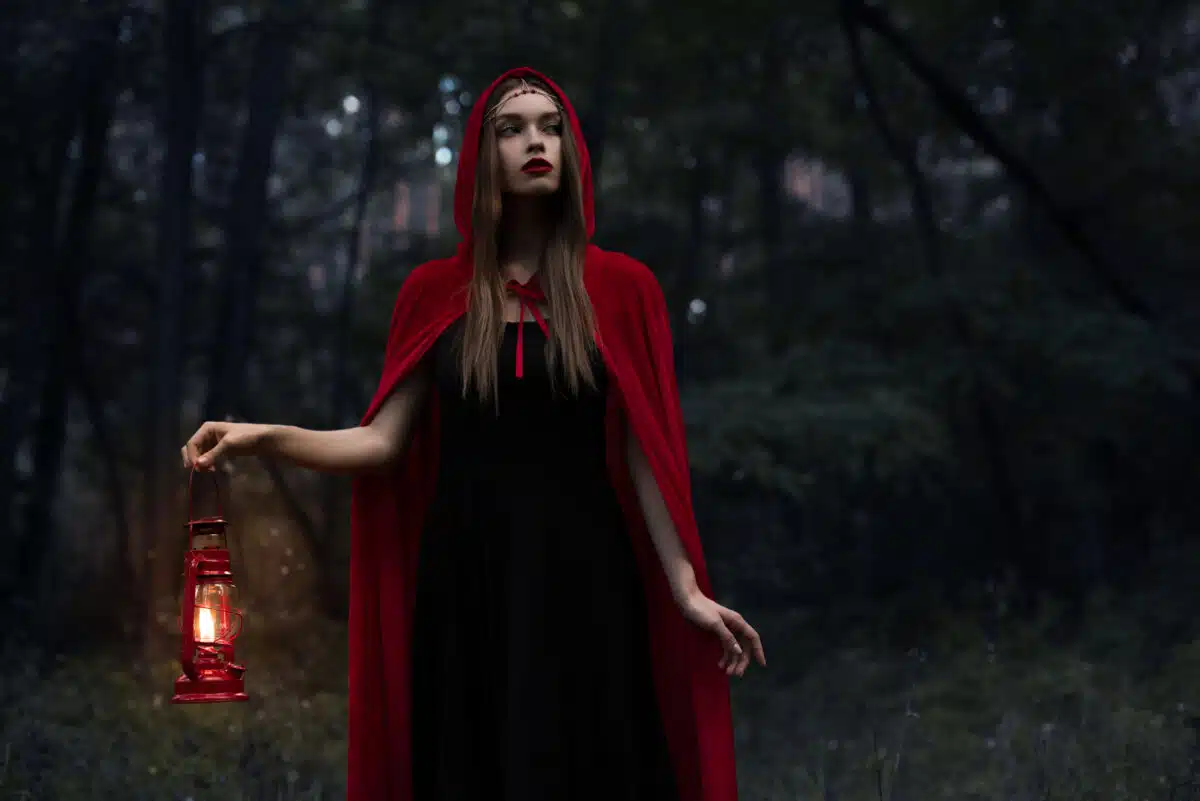
“Kilmeny” by Alfred Noyes
Dark, dark, lay the drifters, against the red west,
As they shot their long meshes of steel overside;
And the oily green waters were rocking to rest
When Kilmeny went out, at the turn of the tide.
And nobody knew where that lassie would roam,
For the magic that called her was tapping unseen.
It was well nigh a week ere Kilmeny came home,
And nobody knew hwere Kilmeny had been.
She’d a gun at her bow that was Newcastle’s best,
And a gun at her stern that was fresh from the Clyde,
And a secret her skipper had never confessed,
Not even at dawn, to his newly wed bride;
And a wireless that whispered above like a gnome,
The laughter of London, the boasts of Berlin.
O, it may have been mermaids that lured her from home,
But nobody knew where Kilmeny had been.
It was dark when Kilmeny came home from her quest,
With her bridge dabbled red where her skipper had died;
But she moved like a bride with a rose at her breast;
And “Well done,Kilmeny!” the admiral cried.
Now at sixty-four fathom a conger may come,
And nose at the bones of a drowned submarine;
But late in the evening Kilmeny came home,
And nobody knew where Kilmeny had been.
There’s a wandering shadow that stares at the foam,
Though they sing all night to old England, their queen,
Late, late in the evening Kilmeny came home,
And nobody knew where Kilmeny had been.
“Sonnet XII” by Fernando António Nogueira Pessoa
As the lone, frighted user of a night-road
Suddenly turns round, nothing to detect,
Yet on his fear’s sense keepeth still the load
Of that brink-nothing he doth but suspect;
And the cold terror moves to him more near
Of something that from nothing casts a spell,
That, when he moves, to fright more is not there,
And’s only visible when invisible
So I upon the world turn round in thought,
And nothing viewing do no courage take,
But my more terror, from no seen cause got,
To that felt corporate emptiness forsake,
And draw my sense of mystery’s horror from
Seeing no mystery’s mystery alone.
“The Haunted Palace” by Edgar Allan Poe
In the greenest of our valleys
By good angels tenanted,
Once a fair and stately palace
Radiant palace reared its head.
In the monarch Thought’s dominion
It stood there!
Never seraph spread a pinion
Over fabric half so fair!
Banners yellow, glorious, golden,
On its roof did float and flow,
(This all this was in the olden
Time long ago),
And every gentle air that dallied,
In that sweet day,
Along the ramparts plumed and pallid,
A winged odor went away.
Wanderers in that happy valley,
Through two luminous windows, saw
Spirits moving musically,
To a lute’s well-tun’d law,
Bound about a throne where, sitting
(Porphyrogene!)
In state his glory well befitting,
The ruler of the realm was seen.
And all with pearl and ruby glowing
Was the fair palace door,
Through which came flowing, flowing, flowing,
And sparkling evermore,
A troop of Echoes, whose sweet duty
Was but to sing,
In voices of surpassing beauty,
The wit and wisdom of their king.
But evil things, in robes of sorrow,
Assailed the monarch’s high estate.
(Ah, let us mourn! for never morrow
Shall dawn upon him desolate !)
And round about his home the glory
That blushed and bloomed,
Is but a dim-remembered story
Of the old time entombed.
And travellers, now, within that valley,
Through the red-litten windows see
Vast forms, that move fantastically
To a discordant melody,
While, like a ghastly rapid river,
Through the pale door
A hideous throng rush out forever
And laugh but smile no more.
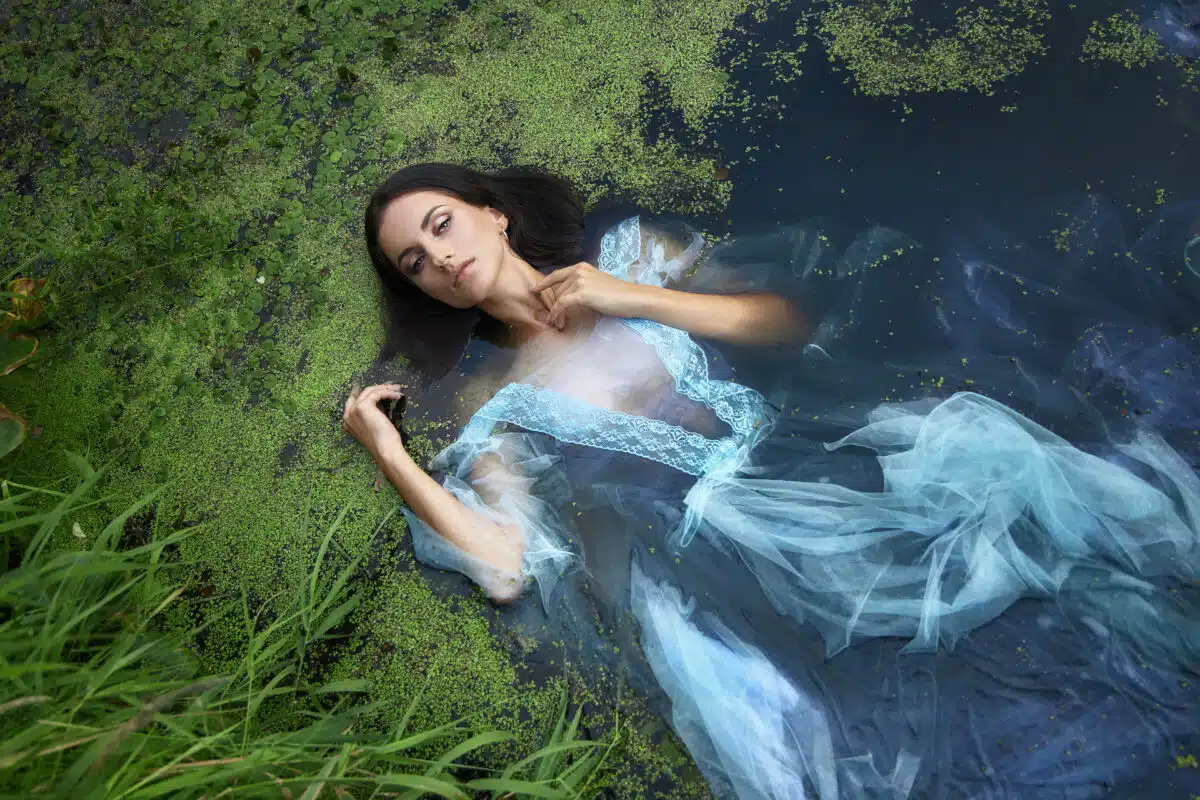
“The Woman by the Water” by Madison Julius Cawein
She stands within the stormy glow
Of sunset, with a face of snow,
The white embodiment of woe,
As night comes on:
She stands within the sombre glare
Of dusk, with dark neglected hair,
An apparition of despair,
When day is gone.
The haggard house within the vale
Looks spectral as a ragged sail
The Dutchman hoists against the gale
On haunted seas:
And in the garden,—one vast brake
Of dock and thistle,—snail and snake
Crawl; and the death-watch taps, awake
In rotting trees.
The stagnant stream along the night
Creeps, like a nightmare, where each white
Lily is an uneasy light,
A wisp up-tossed:
And through the cypress-trees and vines
The gray fox skulks and laps and whines;
The owl hoots; and the foxfire shines
In darkness lost.
She stands beside the stagnant stream;
Her garments drip at every seam;
She looks a shadow in a dream
Of dread and woe:
No star stares half so steadily
At earth as at the water she;
And what she sees there—it may be
The owlets know.
“The Listeners” by Walter de la Mare
‘Is there anybody there?’ said the Traveller,
Knocking on the moonlit door;
And his horse in the silence champed the grasses
Of the forest’s ferny floor:
And a bird flew up out of the turret,
Above the Traveller’s head:
And he smote upon the door again a second time;
‘Is there anybody there?’ he said.
But no one descended to the Traveller;
No head from the leaf-fringed sill
Leaned over and looked into his grey eyes,
Where he stood perplexed and still.
But only a host of phantom listeners
That dwelt in the lone house then
Stood listening in the quiet of the moonlight
To that voice from the world of men:
Stood thronging the faint moonbeams on the dark stair,
That goes down to the empty hall,
Hearkening in an air stirred and shaken
By the lonely Traveller’s call.
And he felt in his heart their strangeness,
Their stillness answering his cry,
While his horse moved, cropping the dark turf,
’Neath the starred and leafy sky;
For he suddenly smote on the door, even
Louder, and lifted his head:—
‘Tell them I came, and no one answered,
That I kept my word,’ he said.
Never the least stir made the listeners,
Though every word he spake
Fell echoing through the shadowiness of the still house
From the one man left awake:
Ay, they heard his foot upon the stirrup,
And the sound of iron on stone,
And how the silence surged softly backward,
When the plunging hoofs were gone.
“The Pool” by Alice Corbin
Do you remember the dark pool at Nimes,
The pool that had no bottom?
Shadowed by Druids ere the Romans came
Dark, still, with little bubbles rising
So quietly level with its rim of stone
That one stood shuddering with the breathless fear
Of one short step?
My little sister stood beside the pool
As dark as that of Nimes.
I saw her white face as she took the plunge;
I could not follow her, although I tried.
The silver bubbles circled to the brink,
And then the water parted:
With dream-white face my little sister rose
Dripping from that dark pool, and took the hands
Outstretched to meet her.
I may not speak to her of all she’s seen;
She may not speak to me of all she knows,
Because her words mean nothing:
She chooses them
As one to whom our language is quite strange,
As children make queer words with lettered blocks
Before they know the way. . . .
My little sister stood beside the pool
I could not plunge in with her, though I tried.
Poems About the Mystery of Death
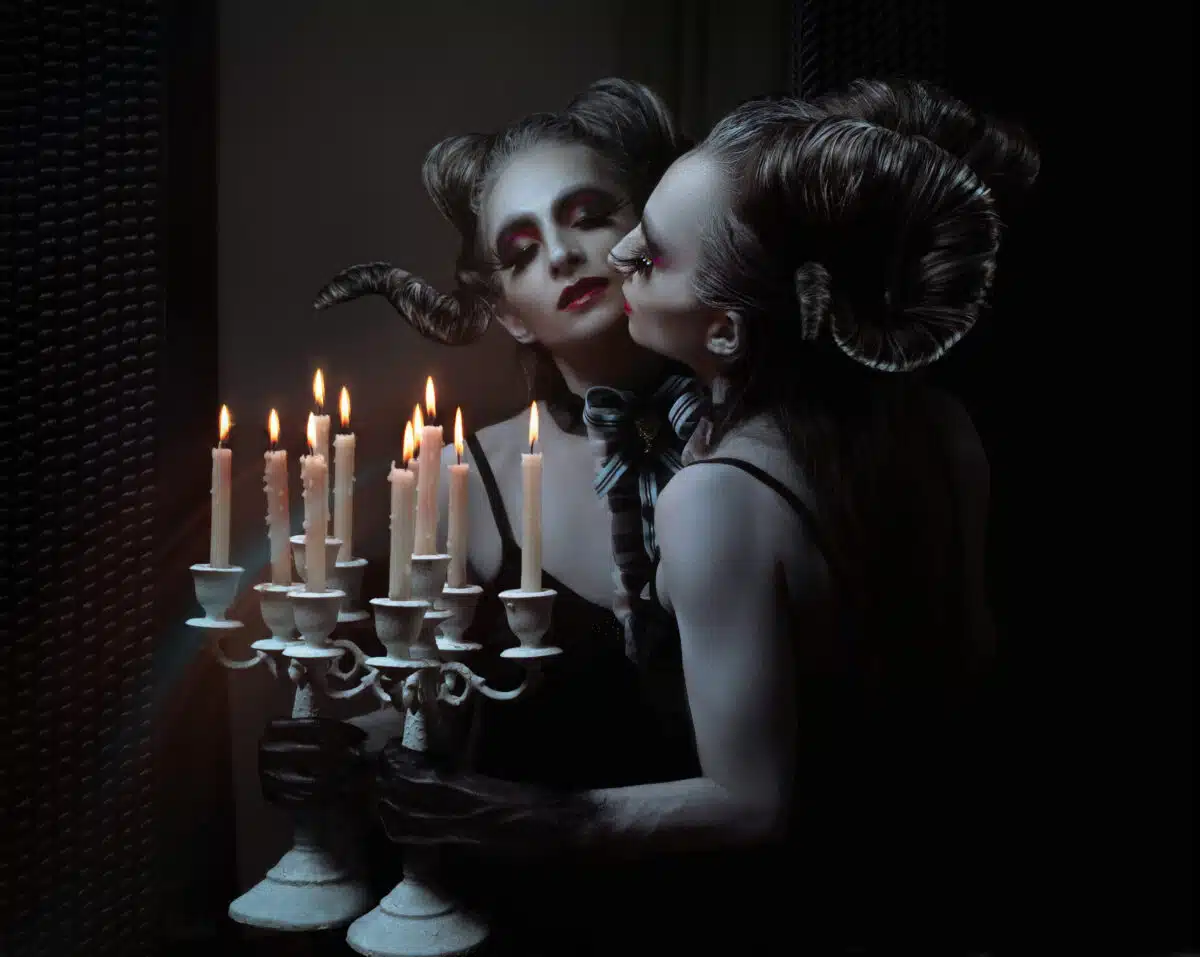
“Mirrors of Life and Death” by Christina G. Rossetti
The mystery of Life, the mystery
Of Death, I see
Darkly as in a glass;
Their shadows pass,
And talk with me.
As the flush of a Morning Sky,
As a Morning Sky colorless–
Each yields its measure of light
To a wet world or a dry;
Each fares through day to night
With equal pace,
And then each one
Is done.
As the Sun with glory and grace
In his face,
Benignantly hot,
Graciously radiant and keen,
Ready to rise and to run,–
Not without spot,
Not even the Sun.
As the Moon
On the wax, on the wane,
With night for her noon;
Vanishing soon,
To appear again.
As Roses that droop
Half warm, half chill, in the languid May,
And breathe out a scent
Sweet and faint;
Till the wind gives one swoop
To scatter their beauty away.
As Lilies a multitude,
One dipping, one rising, one sinking,
On rippling waters, clear blue
And pure for their drinking;
One new dead, and one opened anew,
And all good.
As a cankered pale Flower,
With death for a dower,
Each hour of its life half dead;
With death for a crown
Weighing down
Its head.
As an Eagle, half strength and half grace,
Most potent to face
Unwinking the splendor of light;
Harrying the East and the West,
Soaring aloft from our sight;
Yet one day or one night dropped to rest,
On the low common earth
Of his birth.
As a Dove,
Not alone,
In a world of her own
Full of fluttering soft noises
And tender sweet voices
Of love.
As a Mouse
Keeping house
In the fork of a tree,
With nuts in a crevice,
And an acorn or two;
What cares he
For blossoming boughs,
Or the song-singing bevies
Of birds in their glee,
Scarlet, or golden, or blue?
As a Mole grubbing underground;
When it comes to the light
It grubs its way back again,
Feeling no bias of fur
To hamper it in its stir,
Scant of pleasure and pain,
Sinking itself out of sight
Without sound.
As Waters that drop and drop,
Weariness without end,
That drop and never stop,
Wear that nothing can mend,
Till one day they drop–
Stop–
And there’s an end,
And matters mend.
As Trees, beneath whose skin
We mark not the sap begin
To swell and rise,
Till the whole bursts out in green:
We mark the falling leaves
When the wide world grieves
And sighs.
As a Forest on fire,
Where maddened creatures desire
Wet mud or wings
Beyond all those things
Which could assuage desire
On this side the flaming fire.
As Wind with a sob and sigh
To which there comes no reply
But a rustle and shiver
From rushes of the river;
As Wind with a desolate moan,
Moaning on alone.
As a Desert all sand,
Blank, neither water nor land
For solace, or dwelling, or culture,
Where the storms and the wild creatures howl;
Given over to lion and vulture,
To ostrich, and jackal, and owl:
Yet somewhere an oasis lies;
There waters arise
To nourish one seedling of balm,
Perhaps, or one palm.
As the Sea,
Murmuring, shifting, swaying;
One time sunnily playing,
One time wrecking and slaying;
In whichever mood it be,
Worst or best,
Never at rest.
As still Waters and deep,
As shallow Waters that brawl,
As rapid Waters that leap
To their fall.2.5
As Music, as Color, as Shape,
Keys of rapture and pain
Turning in vain
In a lock which turns not again,
While breaths and moments escape.
As Spring, all bloom and desire;
As Summer, all gift and fire;
As Autumn, a dying glow;
As Winter, with nought to show:
Winter which lays its dead all out of sight,
All clothed in white,
All waiting for the long-awaited light.
“The Two Mysteries” by Mary Mapes Dodge
We know not what it is, dear, this sleep so deep and still;
The folded hands, the awful calm, the cheek so pale and chill;
The lids that will not lift again, though we may call and call;
The strange white solitude of peace that settles over all.
We know not what it means, dear, this desolate heart pain;
This dread to take our daily way, and walk in it again;
We know not to what other sphere the loved who leave us go,
Nor why we’re left to wonder still, nor why we do not know.
But this we know: our loved and dead, if they should come this day,–
Should come and ask us, “What is life?”–not one of us could say.
Life is a mystery, as deep as ever death can be;
Yet, oh, how dear it is to us, this life we live and see!
Then might they say–these vanished ones–and blessed is the thought,
“So death is sweet to us, beloved! though we may show you naught;
We may not to the quick reveal the mystery of death–
Ye cannot tell us, if ye would, the mystery of breath!”
The child who enters life comes not with knowledge or intent,
So those who enter death must go as little children sent.
Nothing is known. But I believe that God is overhead;
And as life is to the living, so death is to the dead.
“The Secret of Death” by Sir Edwin Arnold
“She is dead!” they said to him; “come away;
Kiss her and leave her,—thy love is clay!”
They smoothed her tresses of dark brown hair;
On her forehead of stone they laid it fair;
Over her eyes that gazed too much
They drew the lids with a gentle touch;
With a tender touch they closed up well
The sweet thin lips that had secrets to tell;
About her brows and beautiful face
They tied her veil and her marriage-lace,
And drew on her white feet her white silk shoes—
Which were the whitest no eye could choose!
And over her bosom they crossed her hands.
“Come away!” they said; “God understands!”
And there was silence, and nothing there
But silence, and scents of eglantere,
And jasmine, and roses, and rosemary;
And they said, “As a lady should lie, lies she.”
And they held their breath till they left the room,
With a shudder, to glance at its stillness and gloom.
But he who loved her too well to dread
The sweet, the stately, the beautiful dead,
He lit his lamp and took the key
And turned it. Alone again—he and she!
He and she; but she would not speak,
Though he kissed, in the old place, the quiet cheek.
He and she; yet she would not smile,
Though he called her the name she loved ere-while.
He and she; still she did not move
To any one passionate whisper of love.
Then he said: “Cold lips, and breasts without breath,
Is there no voice, no language of death,
“Dumb to the ear and still to the sense,
But to heart and to soul distinct, intense?
“See now; I will listen with soul, not ear;
What was the secret of dying, dear?
“Was it the infinite wonder of all
That you ever could let life’s flower fall?
“Or was it a greater marvel to feel
The perfect calm o’er the agony steal?
“Was the miracle greater to find how deep
Beyond all dreams sank downward that sleep?
“Did life roll back its records, dear,
And show, as they say it does, past things clear?
“And was it the innermost heart of the bliss
To find out, so, what a wisdom love is?
“O perfect dead! O dead most dear,
I hold the breath of my soul to hear!
“I listen as deep as to horrible hell,
As high as to heaven, and you do not tell.
“There must be pleasure in dying, sweet,
To make you so placid from head to feet!
“I would tell you, darling, if I were dead,
And ’t were your hot tears upon my brow shed,—
“I would say, though the angel of death had laid
His sword on my lips to keep it unsaid.
“You should not ask vainly, with streaming eyes,
Which of all death’s was the chiefest surprise,
“The very strangest and suddenest thing
Of all the surprises that dying must bring.”
Ah, foolish world! O, most kind dead!
Though he told me, who will believe it was said?
Who will believe that he heard her say,
With a sweet, soft voice, in the dear old way:
“The utmost wonder is this,—I hear,
And see you, and love you, and kiss you, dear;
“And am your angel, who was your bride,
And know that, though dead, I have never died.”
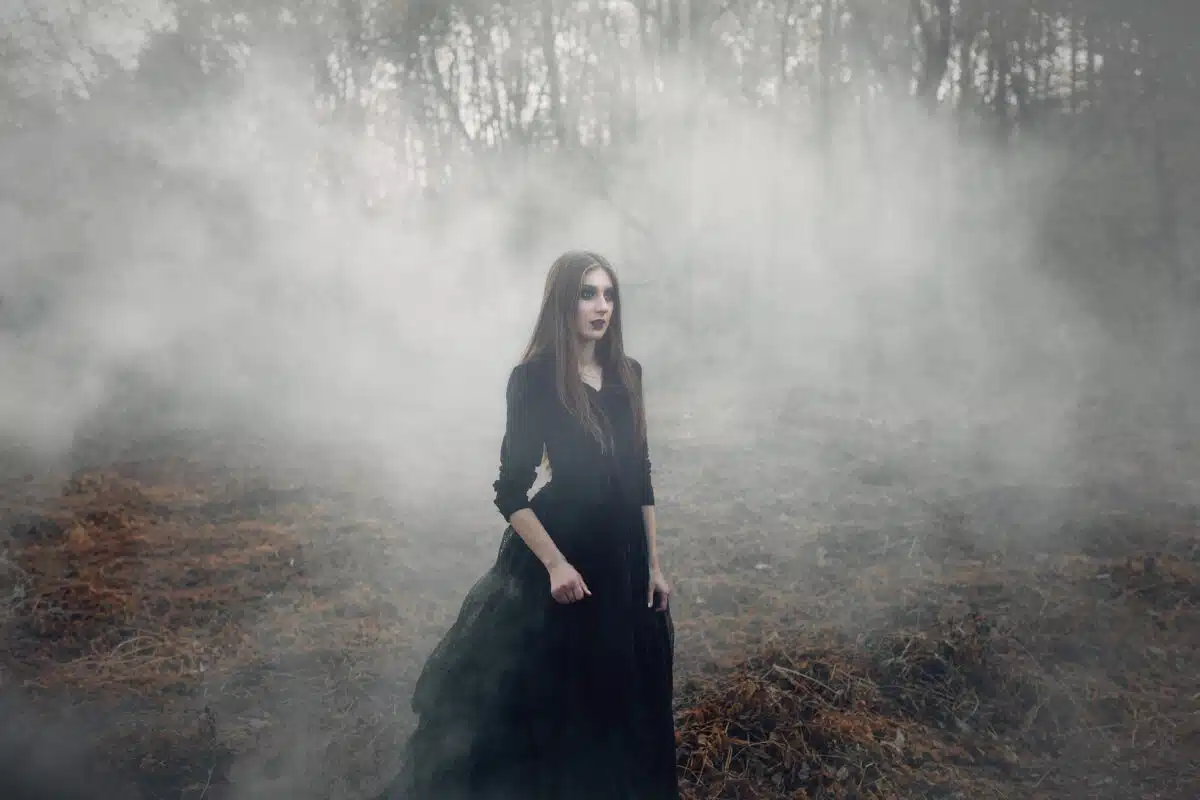
“Spirits of the Dead” by Edgar Allan Poe
Thy soul shall find itself alone
‘Mid dark thoughts of the gray tombstone
Not one, of all the crowd, to pry
Into thine hour of secrecy.
Be silent in that solitude
Which is not loneliness—for then
The spirits of the dead who stood
In life before thee are again
In death around thee—and their will
Shall overshadow thee: be still.
The night—tho’ clear—shall frown—
And the stars shall not look down
From their high thrones in the Heaven,
With light like Hope to mortals given—
But their red orbs, without beam,
To thy weariness shall seem
As a burning and a fever
Which would cling to thee forever.
Now are thoughts thou shalt not banish—
Now are visions ne’er to vanish—
From thy spirit shall they pass
No more—like dew-drops from the grass.
The breeze—the breath of God—is still—
And the mist upon the hill
Shadowy—shadowy—yet unbroken,
Is a symbol and a token—
How it hangs upon the trees,
A mystery of mysteries!
“What of the Darkness?” by Richard Le Gallienne
What of the darkness? Is it very fair?
Are there great calms and find ye silence there?
Like soft-shut lilies all your faces glow
With some strange peace our faces never know,
With some great faith our faces never dare.
Dwells it in Darkness? Do you find it there?
Is it a Bosom where tired heads may lie?
Is it a Mouth to kiss our weeping dry?
Is it a Hand to still the pulse’s leap?
Is it a Voice that holds the runes of sleep?
Day shows us not such comfort anywhere.
Dwells it in Darkness? Do you find it there?
Out of the Day’s deceiving light we call,
Day that shows man so great and God so small,
That hides the stars and magnifies the grass;
O is the Darkness too a lying glass,
Or, undistracted, do you find truth there?
What of the Darkness? Is it very fair?
“Fallen Fences” by William Stanley Braithwaite
The woods grew dark; black shadows rocked
And I could scarcely see
My way along the old tote road,
That long had seemed to me
To wind on aimlessly; but now
Came full to life; the rain
Would soon strike down; ahead I saw
A clearing, and a lane
Between gray, fallen fences and
Wide, grayer, grim stone walls;
So grim and gray I shrank from thought
Of weary, aching spalles.
On stony knoll great aspens swayed
And swung in browsing teeth
Of wind; slim, silvered yearlings shook
And shivered underneath.
Beyond, some ancient oak trees bent
And wrangled over roof
Of weatherbeaten house, and barn
Whose sag bespoke no hoof.
And ivy crawled up either end
Of house, to chimney, where
It lashed in futile anger at
The wind wolves of the air.
I thought the house abandoned, and
I ran to get inside,
When suddenly the old front door
Was opened and flung wide
And she stood there, with hand on knob,
As I went swiftly in,
Then closed the door most softly on
The storm and shrieking din.
A space I stood and looked at her,
So young; ’twas passing strange
That fifty years or more had gone
And brought no new style’s change.
The sweetness, daintiness of her
In starched and dotted gown
Of creamy whiteness, over hoops,
With ruffles winding down!
We had not much to say, and yet
Of words I felt no lack;
Her smiles slipped into dimples, stopped
A moment, then dropped back.
I felt her pride of race; her taste
In silken rug and chair,
And quaintly fashioned furniture
Of patterns old and rare.
On window sill a rose bush stood;
’Twas bringing rose to bud;
One full bloomed there but yesterday,
Dropped petals, red as blood.
Quite soon, she asked to be excused
For just a moment, and
Went out, returning with a tray
In either slender hand.
My glance could not but linger on
Each thin and lovely cup;
“This came, dear thing, from home!” she sighed
The while she raised it up.
And when the storm was done and I
Arose, reluctantly
To go, she too was loath to have
Me go, it seemed to me.
When I reached old Joe Webber’s place,
Upon the Corner Road,
I went into the Upper Field
Where Joe, round-shouldered, hoed
Potatoes, culling them with hoe
And practised, calloused hand,
In rounded piles that brownly glowed
Upon the fresh-turned land.
“Say, Joe,” I said, “who is that girl
With beauty’s smiling charm,
That lives beyond that hemlock growth,
On that old grown-up farm?”
Joe listened, while I told him where
I’d been that afternoon,
Then straightened from his hoe, and hummed,
Before he spoke, a tune.
“They cum ter thet old place ter live
Some sixty years ago;
Jest where they cum from, who they ware,
Wy, no one got to know.
“An’ then, one day, he hired Hen’s
Red racker an’ the gig;
We never heard from him nor could
We track the hoss or rig.
“Hen waited ’bout a week, an’ then
He went ter see the Wife;
He found her in thet settin’ room:
She’d taken of her life.
“An’ no one’s lived in thet house sence;
Some say ’tis haunted,—but
I ain’t no use fer foolishness,
So all I say’s tut! tut!”
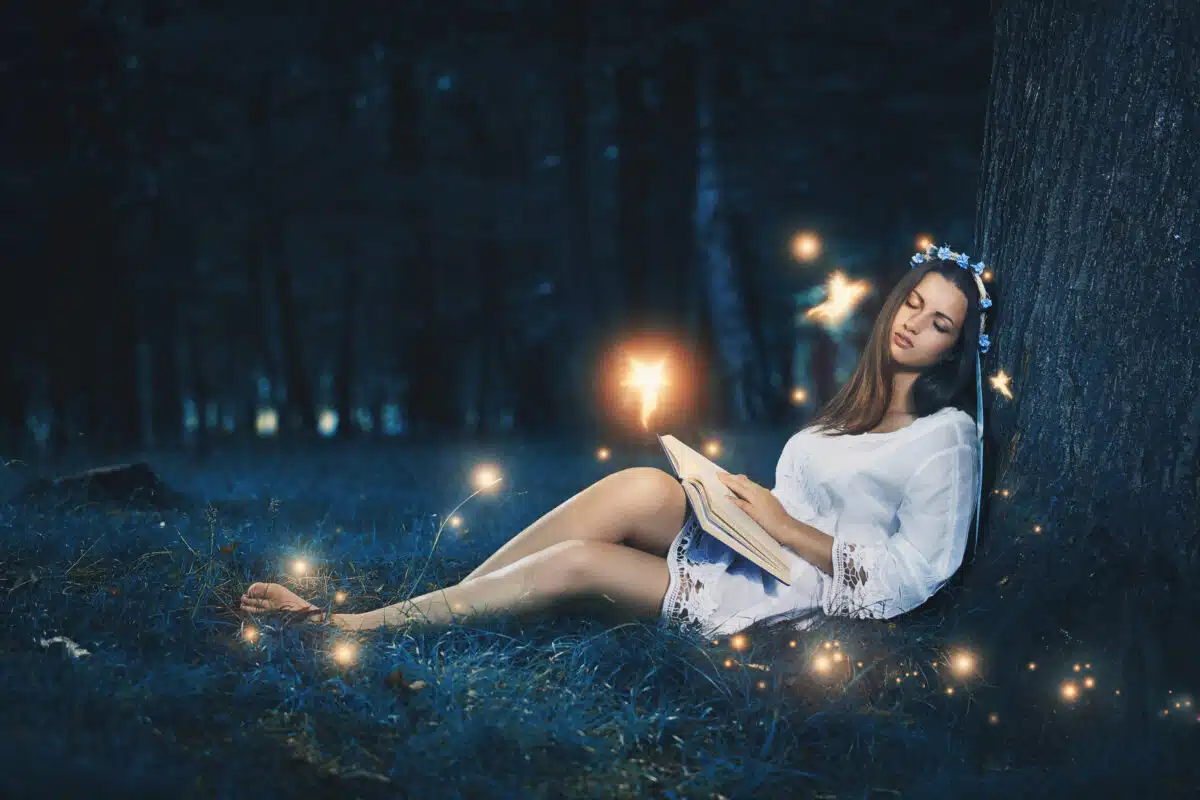
“In Darkness” by Marjorie Meeker
Deep in the heart of darkness I am lying,
Alone and still;
And all the winds of darkness and of silence
Work their will,
Blowing about me through the awful spaces
Of night and death;
Nor all immensity can touch or thrill me
To thought or breath.
Deep in the heart of darkness I am dreaming,
Quiet, alone,
Careless alike of tender words or cruel—
Even your own.
“The Final Mystery” by Sir Henry John Newbolt
Hear now, O Soul, the last command of all–
When thou hast left thine every mortal mark,
And by the road that lies beyond recall
Won through the desert of the Burning Dark,
Thou shalt behold within a garden bright
A well, beside a cypress ivory-white.
Still is that well, and in its waters cool
White, white and windless, sleeps that cypress tree:
Who drinks but once from out her shadowy pool
Shall thirst no more to all eternity.
Forgetting all, by all forgotten clean,
His soul shall be with that which hath not been.
But thou, though thou be trembling with thy dread,
And parched with thy desire more fierce than flame,
Think on the stream wherefrom thy life was fed,
And that diviner fountain whence it came.
Turn thee and cry–behold, it is not far–
Unto the hills where living waters are.
“Lord, though I lived on earth, the child of earth,
Yet was I fathered by the starry sky:
Thou knowest I came not of the shadows’ birth,
Let me not die the death that shadows die.
Give me to drink of the sweet spring that leaps
From Memory’s fount, wherein no cypress sleeps.”
Then shalt thou drink, O Soul, and therewith slake
The immortal longing of thy mortal thirst,
So of thy Father’s life shalt thou partake,
And be for ever that thou wert at first.
Lost in remembered loves, yet thou more thou
With them shalt reign in never-ending Now.
“The Mystery of Light” by Walter Leslie Wilmshurst
Souls there be to whom ’tis given
Easily to enter heaven;
Scarce an effort on their part,
Without struggle, prayer, or art;
Sometimes utterly unknowing
Why such glory should be showing;
Wondering what the reason is
Of the inflaming ecstasies
That Christ giveth unto His.
Often they, not understanding,
Catch a rarer light expanding;
Doing but their daily task,
Falls away some filmy mask,
And before their eyes extended
Heaven with earth is interblended;
And beyond this outward strife
They see what hidden peace is rife
In God’s great reservoirs of life.
Some in that rapt state elysian
Are accorded richer vision;
Watch the thronging angels pass
To a high celestial Mass;
See a veilèd, flaming Centre,
See a Great High Priest there enter,
Whence a Host he lifteth up
And a crimson-brimming Cup,
Which He bids all eat and sup.
Or a day falls, past relating,
When a Dove, divinely mating,
Stirs the sheltering leaves apart
O’er some deeply-nested heart;
And, Himself within interning,
Lo! the very bush is burning
With the blazonry of love
Of that far-descended Dove
In His bridal-mate’s alcove.
Such things simple souls and holy
Often know, whilst men less lowly
Beat the breast and bend the brain
In their labour to attain;
Till from heaven, tired of crying,
They will turn, all heaven denying;
Seeking ways of lesser bliss
Which, in His large Mysteries,
Christ denieth not to His.
Let not me, who have no mission
Yet to see the shining Vision,
E’er forget that night and day
Are His strange vicarious way;
He by one prepares the other,
Glooming me to light my brother.
May I ever blinded be
If my disability
Help my fellow-man to see.
In this night of my unknowing
His symbol-light shall be my showing.
I’ll know that at the rise of sun
High Mass, for all, in heaven’s begun;
That when at noon-tide height it lingers
Christ lifts the Host in His pierc’d fingers;
And at its setting it shall tell
How He descendeth, loving well,
Even to me, His child in hell.
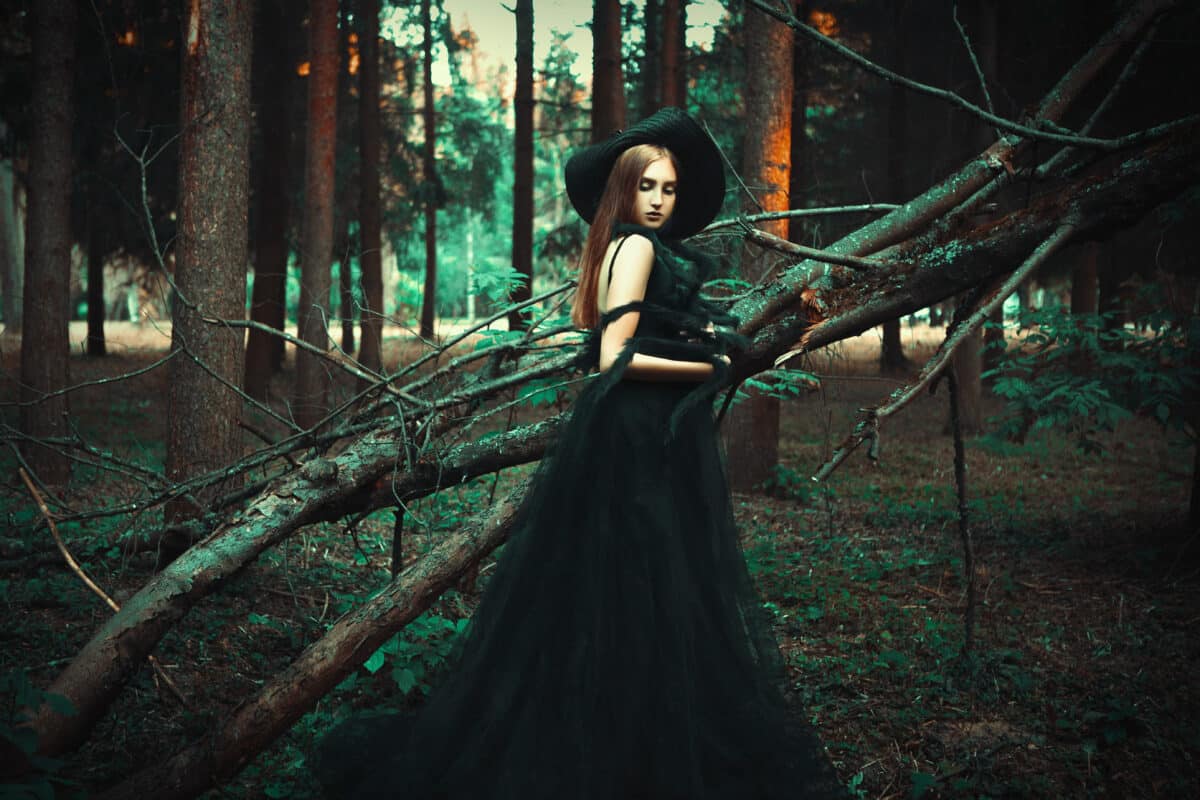
“At Dawn” by Madison Julius Cawein
Far off I heard dark waters rush:
The sky was cold: the dawn broke green:
And wrapped in twilight and strange hush
The gray wind moaned between.
A voice rang through the House of Sleep,
And through its halls there went a tread;
Mysterious raiment seemed to sweep
Around one lying dead.
And then I knew that I had died,
I, who had suffered so and sinned—
And ’twas myself I stood beside
In the gray dawn and wind.
“The Mystic Blue” by D.H. Lawrence
Out of the darkness, fretted sometimes in its sleeping,
Jets of sparks in fountains of blue come leaping
To sight, revealing a secret, numberless secrets keeping.
Sometimes the darkness trapped within a wheel
Runs into speed like a dream, the blue of the steel
Showing the rocking darkness now a-reel.
And out of the invisible, streams of bright blue drops
Rain from the showery heavens, and bright blue crops
Surge from the under-dark to their ladder-tops.
And all the manifold blue and joyous eyes,
The rainbow arching over in the skies,
New sparks of wonder opening in surprise.
All these pure things come foam and spray of the sea
Of Darkness abundant, which shaken mysteriously,
Breaks into dazzle of living, as dolphins that leap from the sea
Of midnight shake it to fire, so the secret of death we see.
“Secrets” by Lola Ridge
Secrets
infesting my half-sleep…
did you enter my wound from another wound
brushing mine in a crowd…
or did I snare you on my sharper edges
as a bird flying through cobwebbed trees at sun-up
carries off spiders on its wings?
Secrets,
running over my soul without sound,
only when dawn comes tip-toeing
ushered by a suave wind,
and dreams disintegrate
like breath shapes in frosty air,
I shall overhear you, bare-foot,
scatting off into the darkness….
I shall know you, secrets
by the litter you have left
and by your bloody foot-prints
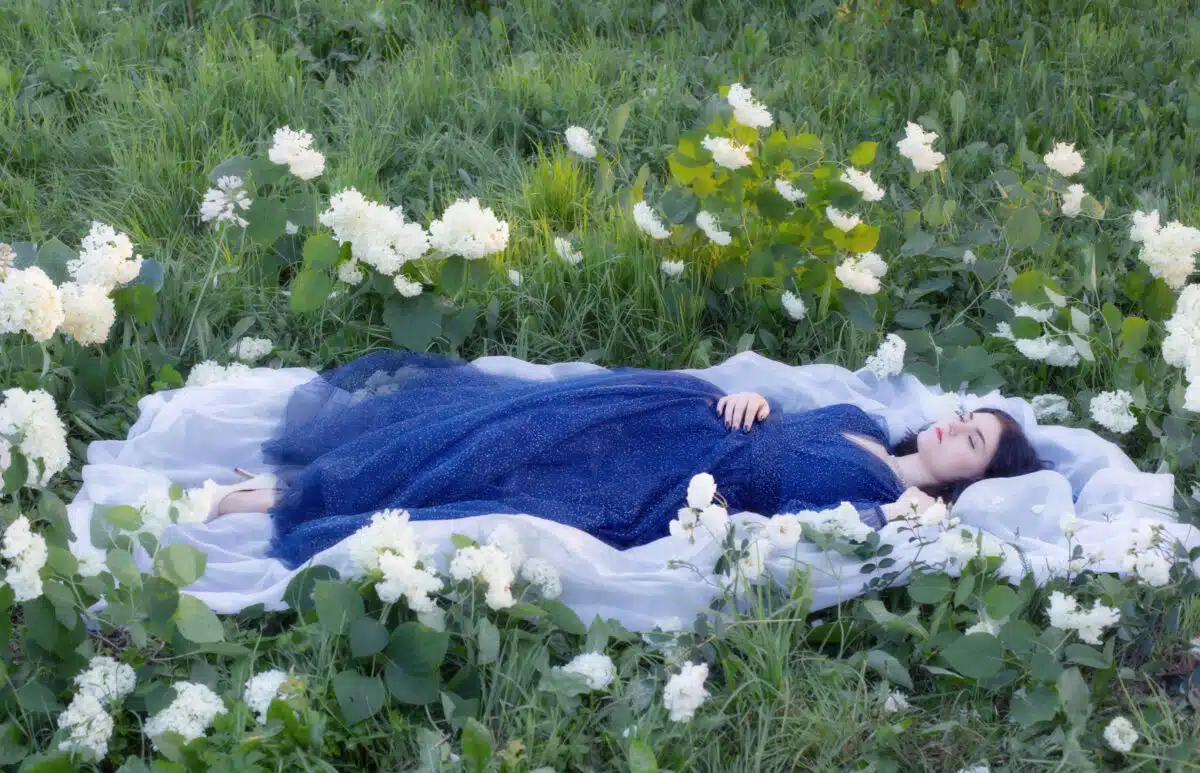
“Where They Sleep” by William Stanley Braithwaite
The for inrolling, dark and still
Lies deep upon the crowded dead
As flooding sea upon the sands,
And quenches starlight overhead.
Long have they slept. Their separate dust
Has mingled with a nameless mould.
Only the slower-crumbling stones
Still tell so much as may be told.
And now in shoreless fog adrift
Like some lone mariner gliding by,
I lean above the drowning graves
And wonder when I too shall lie
Where evermore the tides of night
And earth will hide my lonely rest;
And Time will bid my love forget
To read the stone upon my breast.
“A Common Inference” by Charlotte Perkins Stetson
A night: mysterious, tender, quiet, deep;
Heavy with flowers; full of life asleep;
Thrilling with insect voices; thick with stars;
No cloud between the dewdrops and red Mars;
The small earth whirling softly on her way,
The moonbeams and the waterfalls at play;
A million million worlds that move in peace,
A million mighty laws that never cease;
And one small ant-heap, hidden by small weeds,
Rich with eggs, slaves, and store of millet seeds.
They sleep beneath the sod
And trust in God.
A day: all glorious, royal, blazing bright;
Heavy with flowers; full of life and light;
Great fields of corn and sunshine; courteous trees;
Snow-sainted mountains; earth-embracing seas;
Wide golden deserts; slender silver streams;
Clear rainbows where the tossing fountain gleams;
And everywhere, in happiness and peace,
A million forms of life that never cease;
And one small ant-heap, crushed by passing tread,
Hath scarce enough alive to mourn the dead!
They shriek beneath the sod,
“There is no God!”
“Gitanjali 95” by Rabindranath Tagore
I was not aware of the moment when
I first crossed the threshold of this life.
What was the power that made me
open out into this vast mystery like a
bud in the forest at midnight!
When in the morning I looked upon
the light I felt in a moment that I was
no stranger in this world, that the in-
scrutable without name and form had
taken me in its arms in the form of my
own mother.
Even so, in death the same unknown
will appear as ever known to me. And
because I love this life, I know I shall
love death as well.
The child cries out when from the
right breast the mother takes it away,
in the very next moment to find in the
left one its consolation.
